#like something a reasonable person might form as a generalized observation based on their social experiences?
Text
unfortunately those Cutting and Deep h3ather havril3sky ask polly "here's why you're lonely/here's the empathy failure holding you back" excerpts everyone loves to post
are just permanently recontextualized for me by her series of op-eds about how everyone in her family is an incomprehensible one-dimensional pod beast with completely unlovable preferences for things like "starbucks drinks" and "conversations about their lives", which she tolerates, with enormous difficulty, only through a sense of duty and a bunch of rationalizations about how actually it makes her sexier and cooler that she's willing to endure it
#like. i don't actually know enough about the typical content of one of her Actually You're Failing To Do This Empathetic Basic Mental Action#And That's Why You Have No Friends In Your Thirties and/or Are Constantly Beating Yourself Up For Things columns#because i'm a little generically allergic to that kind of thing#but the excerpts seemed pretty reasonable? sensible people i respect like them? the written content was always the kind of thing that seems#like something a reasonable person might form as a generalized observation based on their social experiences?#but uh. she DOES have an op ed about how listening to her husband tell her about the walk he went on is an experience she only gets through#by imagining that tolerating it makes her beautiful and feminine by contrast to his grizzled broken-down Man Nature#so i. feel like that should have some ramifications for her likely ability to do social modeling and give actually good advice#box opener
25 notes
·
View notes
Text
Armando Iannucci’s written a new play, which I’ve been reading about and it’s had me thinking about his politics lately. I’ve been thinking a lot about political comedy in general in the past year or so, because I’ve always loved it, and maybe hadn’t spent as much time as I should critically considering whether it’s always responsible. I certainly don’t think it’s always a bad thing, and I still think it can be a very good thing, getting people to engage with politics when they might not have otherwise. When done really well, it can get people to see politics from an angle they hadn’t before and understand some of the flaws.
And even when it doesn’t do all that, it can just do what any comedy can do, which is entertain. And it can provide a little relief. Paying attention to politics is difficult and painful and mentally exhausting. It’s cathartic to finish that and then hear someone rip it apart, say all the things you think but say them in a way that’s funny and articulate and makes you laugh instead of cry (or at least, laugh alongside crying).
“So you just want the comedians to parrot back your own views instead of expanding your horizons?” When it comes to political comedy, pretty much. There are lots of political issues where reasonable people can disagree and I want to hear all sides of a story to form an informed opinion, but I’ll get those from the real news, not from comedy. And there are other political issues where I don’t think the opposite side from me is reasonable but I should still know what that side is saying so I can recognize those ideas when I hear them around me in various, sometimes subtle forms, but again, I’ll do my listening to that in more serious ways. I don't go to comedy shows to have my views challenged and shaped, because I don't form my political opinions based on comedy shows. No one should do that.
When I’m listening to comedians, I don’t want to worry about challenging my views and listening to people be terrible. I want to be entertained. I do find it entertaining to hear people say my views in a way that’s smart and funny and well put together, which is why I am a proponent of “But this person is just repeating the audience’s views back!” comedy. I only like it when it’s done well, obviously, but that applies to any type of comedy. Any type of comedy can be done badly, and I think this type of comedy is done badly when comedians forget to be funny, and just literally repeat those views without any jokes or deeper insights or relatable observations other things that make people laugh. But I have seen plenty of comedy routines that were choc-full of those things – the jokes and the relatable observations and the stuff that gets laughs – get called “This isn’t comedy, it’s just repeating the audience’s political views!” No, it’s repeating those views in a funny way, you just don’t find it funny if you don’t share those views. So go listen to something else and let us have our entertainment.
I am a huge proponent of the idea that news should be boring because proper journalism matters, and proper journalism avoids sensationalism. It doesn’t have to be 100% dispassionate, or pretend every piece of information is equal and none has any emotional weight to it. But it should present the facts in a way that is proportionate to their significance, and careful and measured. Topical comedy, of course, shouldn’t be any of those things. I listen to topical comedy after I get the actual news (from CBC, a source that isn’t always 100% perfect because no one is, but I do trust their journalistic integrity), as a bit of relief from it all. If topical comedy were where I learned the news, I’d have a pretty skewed perspective. I think the best topical comedy shows don’t even try that hard to explain the news, they just assume everyone knows the stories already and then make jokes about them. Because everyone should know the stories already. Because you shouldn’t learn it from a comedy show. Or from social media or from clickbait-ridden entertainment sites, because proper journalism matters.
I think my first exposure to comedy about the news was the Rick Mercer Report, a Canadian topical comedy show that aired when I was quite young. I was maybe twelve years old, I’d only just started following the news, my dad worked in the civil service so he talked to me about how government worked (and showed me all of Yes Minister) from when I was quite young, so I was able to get a few more government-based jokes than maybe a lot of twelve-year-olds did, though I’m sure many more went over my head. I found Rick Mercer hilarious and watched him every night.
I was slightly older than that when my mother first showed me The Daily Show, which she introduced to me as “like an American Rick Mercer”, and only now as I write this do I realize how funny it was for her to call Jon Stewart “the American Rick Mercer”. The Colbert Report came on right after The Daily Show, and from around the beginning of high school, I watched both those shows every day. My mother would tape them on the TV, so I’d come home from school and watch the previous night’s episodes. When I started having practice every day after school so wouldn’t get home until late, I’d still put on the previous night’s Daily Show while I did my homework late into the night, and usually catch up on Colbert on the weekends. I loved it.
It was around 2009 when my dad got me into The News Quiz, and from there I started listening to The Now Show as well, though I could never get into Dead Ringers so I’d skip it during those weeks. I loved those shows too, and I quite liked that I could name ministers in the British cabinet, as though I actually knew what I was talking about. I didn’t, of course. I mainly knew that I liked the lesbians on the radio (this was during the Toksvig era with frequent appearances from Perkins and Calman and later Lyons, I was recently out and had never heard so many lesbians in one place and I loved it).
As I got into these shows, I was more informed about American and British news than I’d ever been before, which is not informed enough because like I said you shouldn’t get your news from fucking comedy shows. But in my defense, I was a teenager. I wasn’t going to listen to a bunch of boring regular news podcasts. These comedy shows got me to engage with stories about the government when otherwise I’d have had no engagement at all. Which is probably enough, if you’re a teenager who does not have, or only recently acquired, the right to vote.
It wasn’t until my early twenties that I subscribed to some CBC podcasts and started stayed significantly informed about the actual news. When I did, I was able to understand the stories better because those topical comedy shows had normalized the everyday-ness of government stories in my mind, and had made me find it interesting. I think I’m a lot better off for my engagement with CBC news shows, and I don’t know if I’d have come to that without the comedy shows. So I do think, in my case, topical comedy was a net gain for how informed I am.
What I maybe haven’t thought about enough is how it doesn’t work that way for everyone. Lots of people do get their news from comedy shows and not elsewhere, in a world where standards-adhering journalism is dying. And of course that’s dangerous. Topical comedy can’t get you the news in a proper journalistic way, because as I said, proper journalism has to be boring. It has to be balanced, not in an “all sides are equal, let’s have this racist debate a racial minority” way, but in a way that shows all sides in proportion to their genuine significance. And that isn’t funny. Journalism has to focus on the stuff that matters most, which is rarely the stuff that’s funniest. Topical comedy has to be free from the responsibility to do that, because otherwise it can’t be funny.
I understand why people like Jon Stewart and John Oliver push back so hard against the idea that they’re journalists. There are many reasons to object to that idea (for one thing, it devalues the idea of journalism, and the standards to which it needs to adhere, and therefore devalues actual journalists), but one of them is that if Jon Stewart (or Trevor Noah, or whoever the hell is doing it this week) is the one educating a nation about the news, then Jon Stewart would need to sacrifice humour in order to make sure the most important facts get across. And no political comedian wants to do that. The political comedians (the good ones, anyway) want to perform to a public that already knows the facts, so can get the jokes about them.
At this point, I’d like a brief digression to say this does apply to John Oliver too (as he is constantly the first to admit, and for that matter insist). It bugs me sometimes, when I see people say Last Week Tonight is amazing because it does long-form reporting on important issues and is actually informative and highbrow. It does those things a lot more than most comedy shows. It’s longer and more informative and you’ll get a lot more information, and there are a lot of issues where everything I know about them is what got covered on Last Week Tonight, because he goes into such specific issues that I’m not going to research every one of them to get the full story. And that is great! It is great that he does that. It is great that he is bringing public attention to all these issues that would otherwise go under the radar. But still, a 20-30-minute talk about one subject, where that talk is filled with jokes and sketches and other things to make a comedy show, should not count as a “deep dive” or “longform reporting” that’s just as good as what journalists do. The fact that it gets called those things says something bad about what’s happened to the level in which most people want to dive into most news stories. I don’t want to be all “social media’s ruined everyone’s attention spans and I am 100 years old”, but I social media has ruined everyone's attention spans and I feel 100 years old.
Anyway. Those are some things that I think about topical comedy. I think it led to a greater problem of the entertainment-ification of news. Jon Stewart started putting news into comedy shows, the public started wanting to be entertained while they get their news, and then, news organizations started putting more and more entertainment into news shows. Throw in a shitload more factors (really, lots and lots more factors, I am not saying this is entirely Jon Stewart’s fault), and you end up with actual news institutions riddled with clickbait. People getting news from sketches on social media. Sources of news that aren’t long-running institutions, that popped up during the age of entertainment/news being blended, and that don’t even pretend to be proper journalists, that don’t even do basic fact checking. And now we’re here, and maybe The Daily Show wasn’t worth it.
The other issue with topical comedy, of course (well, an other issue, there are lots) is it makes a joke out of the news. The famous example is Boris Johnson, of course, that he went on Have I Got News For You to be bumbling and humorous, that The News Quiz made years of jokes about his hair and the zipline thing and the rugby thing and all of that made him more famous and got him more attention and made everyone think of him as funny and therefore fun, and that raised his profile in a way that contributed to, you know, everything. Making people a central figure in a news story raises their profile, and making them the central figure in a topical comedy news story raises their profile and pairs them with entertainment in an audience’s mind. I think in the last few years, actual news organizations and decent topical comedy shows have become more aware of that, and started trying to be more responsible, ignoring some stories that aren’t significant and will be made worse by attention, and trying to cover others in a way that isn’t just free publicity. But it’s hard. It’s really really hard to cover a story in a way that doesn’t give it free publicity, because that’s what publicity is.
There’s been a reckoning, then last few years, as everyone looks at the fucking mess around us and tries to figure out the causes, and it’s really unfortunate that those causes involve a lot of things we like, a lot of things I liked. “Fake news” used to just be The Onion. I love The Onion and a few other similar news sites (The Beaverton, Reductress), but when I look at the number of satirical articles that get shared by people who think they’re real, I wonder if a little bit of humour has been worth all the confusion.
A huge part of this is the proliferation of the internet, of course. Stewart-era Daily Show began before the internet was widely used. They could make a joke about a stupid politician without turning that person into a meme. That's one of the biggest things they didn't count on - entering an era in which any joke, even a joke about someone being terrible, can become a meme, and people think it's funny to sneak silly little memes into important places. Jon Stewart's Daily Show was not ready for the memes, and by the time we as a society started to figure this out, a massive amount of damage had already been done. And despite the reckoning, the efforts by some people to start being a bit more responsible, massive amounts of damage are still being done constantly.
Has anyone seen the sitcom Great News? Great News deals with this whole issue in a fun way. I am 100% aware of the irony of me recommending a sitcom that deals with this issue in a fun way as a good way to learn about a serious issue, while I write this exact post. But it is a good show.
Anyway. There’s a difference between topical comedy shows and fictional political comedy, but they have many of the same issues, especially when a fictional comedy show can map too specifically onto real-life parties/people/governments/policies. And that brings me to my favourite TV show in the whole world, The Thick of It. I first got into it in my late teens, I watched In the Loop in the local cinema when it was released (I hardly ever go to movie theatres so this has stuck in my mind even though it was 2009), and I watched every episode over and over and over. I still do watch it regularly. It’s still my favourite show.
I liked it because it showed the government for what I thought it probably was. There’s the West Wing view of the government/politicians, that they’re noble heroes fighting for ideals, and there’s the House of Cards view, that they’re Machiavellian cutthroat 4D Chess-playing murders. And then there’s The Thick of It (and In the Loop, Veep, and its predecessor Yes Minister) view, that they’re all a bunch of people running around trying not to get fired, just like in every other job. My dad was a civil servant for most of my life, though when I was a young kid he was advisor to some politicians. Based on what I saw from him, and how I heard him talk about his job, I was pretty sure The Thick of It had the right idea about the government.
I remember when season 4 of The Thick of It came out, in 2012. I remember watch the last couple of episodes, and going online to see what people thought of it. I saw those episodes very differently from a lot of people on the internet. I remember all these people saying it was a tragic ending that a hero like Malcolm Tucker would be brought down by the establishment, red tape ruining a great man who truly had the nation’s best interests at heart.
I didn’t think that was the case. I thought those episodes made it clear, though you had to read between the lines a bit. Malcolm Tucker made some big, impassioned speeches in those last couple of episodes, about doing what he did for the good of the country, civilians just don’t understand what needs to be done, because all this bureaucracy gets in the way. But it turned out he was lying. The central part of his biggest speech, the claim that he will ruthlessly go after immoral politicians because they need to be held to account, but he’d never leak that nurse’s medical records because he was a civilian and Malcolm protects civilians rather than hurting them – the audience didn’t know, when Malcolm made that speech, whether it was true. So it was a big reveal for us as well as the characters when later on, Malcolm was presented with proof that he had, in fact, leaked the medical records. Everything he said in that speech was bullshit. He was making it up to save his own skin, like always.
I thought it was pretty clear that the show’s writers meant for us to see it that way. For the reveal to be impactful because it makes us understand that Malcolm Tucker’s impressive-sounding speech was just bullshit, that he’s just an immoral man who broke the law. But the internet, or at least the parts of it I found while looking up people talking about The Thick of It right after that episode aired, was full of people calling him a hero who was tragically brought down.
When writing this post, I was pretty sure I remembered reading multiple instances of Armando Iannucci repeatedly saying that he doesn't like how Malcolm Tucker became such a popular character. But then I thought I might be making that up, so I did a quick Google. I immediately found an article called "Malcolm Tucker was a warning, not a hero: Thick of It creator", containing the quote from Iannucci:
People like Malcolm Tucker have become heroes to people going into politics … They start modelling themselves on Malcolm Tucker and I say to them ‘Malcolm Tucker is the problem. He’s not the solution. In fact, in every episode of The Thick of It, even though you think Malcolm is the fixer, it’s when he steps in and tries to repair the damage, it falls apart.'
I found that a bunch more articles like it, I was right to remember that Iannucci has repeatedly said Malcolm Tucker shouldn't be seen as a hero. I'm pretty sure Peter Capaldi has said similar things. But still, if Armando Iannucci created a show that portrayed Malcolm Tucker as a hero, then he can't be shocked if people see it that way. I guess there's a good argument that says he should have done a better job of making it clear to the audience that they're not supposed to be impressed by this guy.
I thought the finale also made this clear in Malcolm Tucker's final confrontation with Ollie. When Malcolm tried to pull that argument he pulled all the time, that he was doing what needed to be done and no one else had the guts to do it, and Ollie, for once, just said no. You're wrong, Malcolm. Times have changed, it doesn't have to be that way anymore, you've made everything worse. I remember watching that scene and thinking it was an interesting character arc to end on Ollie being right for the first time ever. But given that Ollie has been wrong about everything else, and is also a terrible person, I guess I can see how other people would watch that scene and think Ollie doesn't know what he's talking about so this is more proof that Malcolm Tucker is right.
(Obligatory note: I'm talking here about people who think Malcolm Tucker was a great hero that the government needed and we'd be better off in real life if he were real and in charge of things, and he's a fictional example of the real phenomenon of the bureaucratic establishment keeping people down when they do what needs to be done. Obviously, there is nothing wrong with just enjoying the character as the fucked up horrible person he is, because horrible people in fiction can be fun. My favourite fictional character in the world is Malcolm Tucker's right-hand man Jamie MacDonald, and he shouldn't be put in charge of a toy car, much less a nation.)
Obviously, there are also more issues with The Thick of It than just whether we should think Malcolm Tucker's cool. Fifteen years ago, ten years ago, twelve years ago, I thought "just a bunch of people running around trying not to get fired" really was what government and politics were like. I'm not so sure anymore. I look at who's been getting elected lately, at the highest levels but also at the lowest levels, and I think that somehow, and incredibly bleak and cynical show like The Thick of It went too easy on them.
I still love the show. I'd just been thinking about some of these things in general lately, thinking I should probably be more critical than I had been before of political comedy and its effect on society. And then I read some stuff about this new play that Ianucci's written, and that made me think those things even more, and then I wrote them down. I tend to be an apologist for the more panned parts of Iannucci's work - I saw some minor-to-major flaws in Avenue 5 but I still quite enjoyed the show and wished it had had time to grow into itself, I think it could have been great. I enormously enjoyed the one episode of Gash I've been able to find. I saw Death of Stalin in that same cinema and thought it was brilliant. But yeah, I have to admit this play looks like it probably sucks in all the ways I've gotten into in this post. It's disappointing, but not shocking. Maybe the satire fans deserve better than Iannucci in this increasingly fucked up world.
2 notes
·
View notes
Note
How does one tell the difference between a human and a gifted? Is there a certain appearance, behavior, or feelings/vibes that differentiate a gifted to a human?
Aha, for the most part, its commonly not so easy to tell. It truly depends on the person (how much they’re willing to expose themselves / how little control they have over their gift) and their gift itself.
The MC has quite the unique advantage in their ‘sixth sense’ for the Gifted— even if that sense is a gnawing hunger, haha! Other Gifted have no sense for this. Others share in an innate awareness to their kind. Those that are heavily socialized with the Gifted, like the MC’s human father, might be able to identify behavioral patterns associated with concealed gifts that could draw suspect. Such patterns otherwise may just seem like unique coping mechanisms, nervous habits, or learned behavior when it might be just as unique to whatever type of gift they’re trying to restrain.
Gifted with experienced permanent physiological changes are easy to spot, especially if the traits are difficult to cover-up. In the vampiric clans, for example, one child might be able to retract their fangs. Another might have them permanently protruding, and thus is reliant on masks with their attire when roaming human grounds. One might not have control over their thirst, their fangs flashing from their human façade with all impulse and no thought, and is thus confined to the home and kept fed as to not excite a frenzy or jittery behavior in general among large human crowds. But perhaps, to the casual observer when their mouth is obscured, they’re simply witnessing a public mental health crisis or form of anxiety in an urban setting where everyone is too busy or desensitized to such scenes to care. Others may see, or suspect, their lashing and restraint by relatives for what it is and report to DOVES immediately in fear for their safety— especially if the region is on high alert following a Gifted attack.
Others may simply have an ‘air’ about them, like Tanith whose presence (as a result of her gift) carries a natural soothing effect to make her targets more susceptible to her influence. Then again, the more laidback, trusting, or those fearful of being perceived as irrational / paranoid might be hesitant to accuse her of being a Gifted on the claim that “I feel calm when I’m around her”, haha!
In the first (Origin) chapter, the MC will encounter a CARDINAL (and whichever one is determined by their career). There will be an acknowledgement from the CARDINALS to the MC about their Gifted nature, mostly subtle in (the possible case of) a human audience. This is due to them having enough companionship with fellow Gifted to perceive a ‘certain look about them’, one born from a life of suppressed attributes and hunted personhood. It’s similar to how someone might look at another person and recognize that they are from the same place, or shared some deeply altering shared experience, because of that special ‘something’ about their eyes, maybe even their movements or speech.
Otherwise . . .
Gifted like Imka, Elouan, and Retriever lack a ‘sense’ for their kind, and would instead be reliant upon their deductive reasoning. Imka being the least familiar with Gifted companionship might not be able to tell based on conversation, but subtle cues in her environment might make her wonder if something—or someone—nearby is not what they seem. Elouan relies on his ability to read people’s behaviors, not caring whether someone is or isn’t Gifted unless there’s a chance they might turn that gift on him. He can be pretty spot on, perhaps more so (and with more confidence) than Sigmund when combing through a large crowd of suspects, though there’s nothing supernatural about his knack for this.
Sigmund bears a vague sense, though it’s difficult for him to focus beyond a “general presence”— kind of like when someone experiences a cold draft and then wonders if its simple caution that's exciting a paranoia or the true essence of a ghost. It's vague to the point that he rarely thinks to share his suspicion unless its possible a high-risk to someone in his company.
Fyodor senses the Gifted with absolute ease, though it’s a more instinctual sense, but rarely thinks to make mention of it unless he finds something particularly interesting about them to comment on.
Gabriel has no sense for the Gifted, but his penchant for sudden appearances and disappearances out of nowhere might make some suspect him . . . Or make others think he’s incredibly sly for a large man, haha!
Mishka perceives the Gifted as well, highly aware towards the nature of their gift, their attunement, and the exact pinpoint of their location.
Curadora might gleam a nearby Gifted’s presence by overhearing their thoughts pertaining to their gift and its use, but she otherwise keeps an eye on behaviors that might seem like someone is masking something about their person.
Bones and Lempo struggle to blend into humanity, the first too altered in his form to pass for human and the second too unmastered in her gift to reign in its notable presence.
Bones has lessened his presence among human crowds due to the tedious extents he must endure just to have the chance of melding without any suspicion. From his skin to his eyes, his scent and his presence, it all carries traces of his dormant gift to the suspicion of human eyes. His social scene, if he ever has the heart or mind to seek it out, has been greatly reduced to underground havens for the Gifted.
Lempo has been advised by Uriel and Curadora to avoid wandering aimlessly among human, especially since humans are more susceptible to the near constant effects of her natural aroma, yet it has done little to stop her. It’s a bit eye-catching when an entire room of strangers is suddenly (supernaturally) elated or sedated while appraising her (an absolute stranger) as the star of the hour.
Retriever lived entirely below the radar, with exception to Gifted with a sense for their kind . . . and he would have had the potential to remain a seemingly absolutely average human had it not been for his loose tongue when he believed he was in love.
Really, most Gifted just have a greater awareness towards unusual happenings around them since they’re constantly self-policing their environments and own gifts, and that translates into a greater alertness for a proximal Gifted.
Bacara knows to keep an eye on shadows, and that gives him a quick sense for Gabriel. Boar has been in countless fights with humans and Gifted alike, and she recognizes the different reactions humans and Gifted exhibit when they sense danger in her presence. Mutya has been in enough encounters to be vigilant towards the odd twitch of one’s fingers when cornered, or a look of confidence when confronted as though they bear a hidden sword and shield up their sleeve.
Humans have it tough when it comes to living obliviously beside these superhuman entities, and that’s what makes the DOVES an even more cherished institution as they ease this fear of the unknown. It’s up to them to profile potential suspects for Gifted-related activity and their threat level to humanity. False reports are common, hence the emphasis on mediation to quell possible frightened mobs in certain communities against harmless humans.
19 notes
·
View notes
Text
Quick and Easy Fix For TikTok Influencers
We don't need to tell you that TikTok is currently the social media platform with the most buzz and trending content.
Are you trying to become a TikTok Influencer? Do you want auto views TikTok free? You want to, of course. Read this entire post.

Everyone wants to become an influencer on TikTok because of its excellent benefits. Influencer marketing consequently likely becomes the most popular and promising form of advertising available.
Customers don't know who to trust with an increasing demand for attention and a wide range of product options. As a result, customers are more likely to believe word-of-mouth marketing from their friends and family than brand-specific advertising.
And that is where Influencers play a vital role.
This post will list some quick and easy fixes for TikTok influencers to gain more views and grow on the platform.
Let's jump right in.
1. Pick Your Niche
Finding and concentrating on your area of interest is the first step to becoming a famous TikTok influencer.
By selecting a topic you are enthusiastic about, you are more likely to conduct your research and become an expert. In addition, it creates the groundwork for frequently producing top-notch content and getting auto views TikTok free.
2. Strengthen Content Strategy
After developing your content strategy, you must schedule a time for your video uploads. You can tell your audience when and what kind of content to anticipate in this way.
Follow the latest trends and add some humour to your content to engage new viewers. Buy TikTok auto views and incorporate popular tunes in your videos to draw viewers to your segment.
3. Set Up A Unique Profile

Both brands and creators can sign up for accounts on TikTok.
On the other hand, a brand needs a business account, whereas an influencer needs a creator account.
Once you've made the proper account, you need to set up your profile, which calls for you to enter information like your bio, profile picture, and video.
Adding special touches may establish your personality and make a lasting impression on your fans. Additionally, you can even buy TikTok auto views to give a boost to your profile.
4. Know Your Audience
You need to be unique, fresh, and informative to attract more audiences. It may compel your followers to follow you.
If not, you can still offer it in a way that is appealing to your target viewers. To develop an effective content strategy, you must first comprehend your target.
Analyse your follower base for this purpose, then look for the post that generated the most engagement.
5. Analyse Your Competitors
You can gain insight into the market's needs by being aware of your competition. Discover the influencers who are active in the same demographic and use them for this reason.
Use the observations as motivation to develop something original or improvise on what is already there. Ascertain whether they buy TikTok views by keeping an eye on the number of views.
6. Network With Other TikTokers
Keeping up a good relationship with other TikTokers enables you to see them as more than just rivals. You might even be given opportunities for collaboration due to your relationship.
Engage other TikTokers by leaving comments, sending them messages, or giving them a like.
Also Read: Fascinating Tactics To Get Views On TikTok
Conclusion
As a TikTok influencer, you need to create high-quality content to improve the number of video views. Additionally, how well you interact with your audience is crucial because it grows your fan base and draws companies.
Implement these quick and easy tips in your TikTok account to enhance your growth as an Influencer. You can even buy TikTok views to promote your profile or post on that platform and become a famous influencer.
No matter what influencers look like, TikTok influencers provide enormous potential for your brand or company to succeed, regardless of sector or niche. Keep up with us to read more exciting posts.
#TikTok Influencers#Easy Fix For TikTok Influencers#TikTok#buy TikTok auto views#TikTok auto views#auto views TikTok free#buy TikTok views
0 notes
Text
What is Drug Addiction and How to Quit?
What is Drug Addiction?
Illicit drug use is a constant sickness described by urgent, or wild, drug chasing and use notwithstanding destructive outcomes and changes in the cerebrum, which can long endure. These progressions in the cerebrum can prompt the unsafe ways of behaving found in individuals who use drugs. Chronic drug use is likewise a backsliding illness. Backslide is the re-visitation of medication use after an endeavor to stop.
The way to illicit drug use starts with the deliberate demonstration of ingesting medications. In any case, over the long haul, an individual's capacity to decide not to do so becomes compromised. Looking for and taking the medication becomes enthusiastic. This is generally because of the impacts of long-haul drug openness on cerebrum capability. Compulsion influences portions of the cerebrum engaged with remuneration and inspiration, learning and memory, and command over conduct.

A Drug is something that for the most part begins with pursuing entertainment only and winds up at the phase of dependence. This is a problem that influences an individual's perspective as far as possible. Drugs and Substance Abuse are the most incredibly horrendous things one might at any point get dependent on ever throughout everyday life. Habit ruins not just the existence of the person who admissions it yet additionally the group of that individual. Why fault attempting exclusively, there may be different circumstances like Peer pressure, family issues, private matters, and so forth, that could drag an individual into compulsion. Is it a direct result of this reason that foundations like Nasha Mukti Kendra in Punjab arose to help the ones who are caught in the net of dependence?
Treatment for Drug Addiction
Guiding and other social treatments are the most normally utilized types of treatment. Meds are much of the time a significant piece of treatment, particularly when joined with social treatments. Treatment plans should be inspected frequently and altered to fit the patient's evolving needs. Treatment ought to address other conceivable mental issues. Restoratively helped detoxification is just the main phase of treatment. Treatment needn't bother with to be intentional to be viable. Drug use during treatment should be observed consistently.
Individuals dependent on drugs frequently let completely go over their own decisions. In spite of vowing not to consume medications once more, they wind up doing likewise. They need Nasha Mukti Kendra in Ludhiana to deal with themselves. This isn't a mental weakness to control detects. It has depletion, nausea, temper, anxiety, and so forth. The all-encompassing treatment of Nasha Mukti Kendra in Delhi opens the passage of chances for solid taking care. The patients go through advising, conduct treatment, prescription, and medication-based which control the extraction side effects. We attempt to help individuals according to all viewpoints.

Different offices are accessible at our Nasha Mukti Kendra in Dharamshala in order to assist patients with coming thoroughly out of the circumstance of enslavement. We invite individuals kindly who will stop a habit and serve them with the most ideal offices to assist them with stopping the admission of medications. Such habit-forming schedules will generally influence day-to-day existence too separated from a drawn-out premise. It turns out to be extremely prickly to overcome compulsion without help from anyone else. For such reasons the Nasha Mukti Center in Yamuna Nagar goes about as an emotionally supportive network for you, ending up hugely supportive as we are the experience holder in dealing with different patients. We grasp the worth of your life, and thus, really buckle down with you to haul you out of chronic drug use.
Content Source: - Blogger
#Nasha Mukti Kendra in Punjab#Nasha Mukti Kendra in Ambala#Nasha Mukti Kendra in Ludhiana#Nasha Mukti Kendra in Yamuna Nagar#Nasha Mukti Kendra in Panipat#Nasha Mukti Kendra in Hoshiarpur#Nasha Mukti Kendra in Haryana#Nasha Mukti Kendra in Rajpura#Nasha Mukti Kendra in Dharamshala#Nasha Mukti Kendra in Gurdaspur
0 notes
Text
Furuba autistic headcanons
With it being April, or autism acceptance month, I wanted to finally drop my list of characters from Fruits Basket that I read as autistic! This is based a lot on my own experience, as well as that of other autistics I know or have seen talk online. I hope some people can get something out of it, feel free to tell me what you think 😊, though please refrain from getting upset that I would dare suggest your fave is autistic.
Hanajima
Before becoming able to better control her powers, she would be constantly overwhelmed by the things she heard to the point that she couldn't even really go out in public. This reads a lot like sensory overload.
Constantly picked on in school because other kids thought she was weird. Eventually reclaimed this weirdness and turned it into a whole persona.
Seems to talk usually in a relatively flat tone.
Had trouble socializing with no friends outside her family until middleschool.
Has a very funny, dry sense of humor that I find very similar to a bunch of autistics I know, including myself.
Hatsuharu
Listen. You have seen the funky little man, you have seen the way he talks, the way he acts around others. He is, and I mean this in the best way, a weirdo. I do not know how you could look at him and see a neurotypical.
Once again, like Hana, Haru is funny in a way that feels very autistic.
Very flat, dry, tone delivery. Sometimes just Says Things that make everyone else go huh??? Suuuuper blunt. Doesn't emote facially a lot of the time.
When this man sees a social norm he doesn't get he WILL NOT follow it. Pierces his ears just because his hair got flak, defends Momiji wearing whatever he wants because sometimes y'know the social rules are just dumb and don't make sense. Especially dress codes.
Sometimes says things not befitting the current tone of the situation.
Represses (masks) a lot of his emotions, leading to outbursts that seem uncharacteristic.
His main childhood trauma revolves around adults branding him as "dumb" and ridiculing him. Haru, however, is super smart and wise!! Just in an offbeat way that not everyone may get.
Machi
Reads as very "flat" emotionally to the point that others would call her boring. Also has a flat vocal delivery.
Relies on specific habits or ways of doing things or else she gets super upset (her hatred of imperfection.
Has trauma surrounding adults completely misconstruing her intentions and thinking she's doing something malicious when she's not.
Generally behaves in a way that's hard for others to understand, one of her formative moments with Yuki was him saying he wanted to "see how the world looks" through her eyes.
Once again, trouble socializing.
Tries super hard to please her parents but in the end they still see her as somehow inherently "defective."
Listen. A lot of this one and the last two are mostly vibes, hard to verbally define. You just have to look at them and trust me.
Tohru
Displays behavior very reminiscent of masking throughout the story, a huge part of her arc is about how she hides a lot of herself and has a very controlled persona. I think it would fit very well if she had other autistic behaviors that she suppresed also it helps explain why she is relatively socially adept, it's learned behavior to make people like her more.
Yes she is very good at saying what others need to hear, but especially early on she is pretty blatantly imitating her mother's words. She only gets better at getting through on a more personal level later on (see her with Rin and Akito v. early series Tohru). She does this by relating her own experiences, a very autistic way of showing empathy that often gets us written off as self centered. The way she relays things her mom said could also be seen as this, and she even worries at a few points that she's being insensitive for going on about things like that.
While emotionally repressed she is hyper empathetic and feels other's emotions so strongly she cries.
Her speech patterns are all imitated from her father and she often copies verbal things from others (see Ritchan-san). Noted in canon that people think her way of speaking is slightly off/not befitting of someone her age. Additionally, her father was polite more sarcastically, while she plays it straight and sometimes takes things very literally or fails to get the message, indicating trouble with reading tone. Has numerous strange verbal tics, including saying parts of her internal monologue out loud without context.
Very expressive with her hands including waving them around and flapping them up and down.
Does have a bit of trouble with accidental insensitivity in social interactions, like how she constantly fixates on her mom and realizes that might bug the Sohma.
Has trouble paying attention in school since it doesn't have much to do with her interests
Her only friend until she was a middle schooler was her mom
Has a pretty unique outlook on things compared to others, people seem to think she's pretty eccentric. There's always a "this girl is nice but in an odd way, she's our weirdo and we love her" vibe.
Sometimes has an "inappropriate" emotional response to situations
Has a lot of trouble with change, similar to Akito. Which oh, look at the time, next hc coming up.
But first, a disclaimer. It is cathartic for me to read Akito this way, but with that reading comes the baggage that she would, mayhaps, be showing a more negative side of things... It doesn't bother me since it's a joint hc with other characters and she does develop at the end but yeah, general villain hc baggage. This is in no way me trying to excuse her being The Worst being autistic doesn't absolve you of being able to do wrong . Also, a lot of these points can and do have other explanations related to her upbringing, but things can be for more than 1 reason. With that said, she really strongly comes off as autistic to me, in a way that's sorta hard to explain. I wrote a lot more for her than the other, both because I felt I needed more to convince people and that this headcanon was more sensitive and I needed to be careful in my explanation. Also hey! She's my special interest within a special interest.
Akito
Shown to have a dislike of summer weather due to heat and brightness, could be due to sensory issues in tandem with sickness things. Also covers her ears when people raise their voice sometimes which is partially her trying to shut down opposition but also 🤔 can read a different way. She'd also avoids louder Juuni like Ritsu and Ayame because she can't handle them.
Wears pretty much the same outfit every single day. Said outfit is also pretty loose fitting.
Always seen sitting in a pretty unconventional way. Evidence:
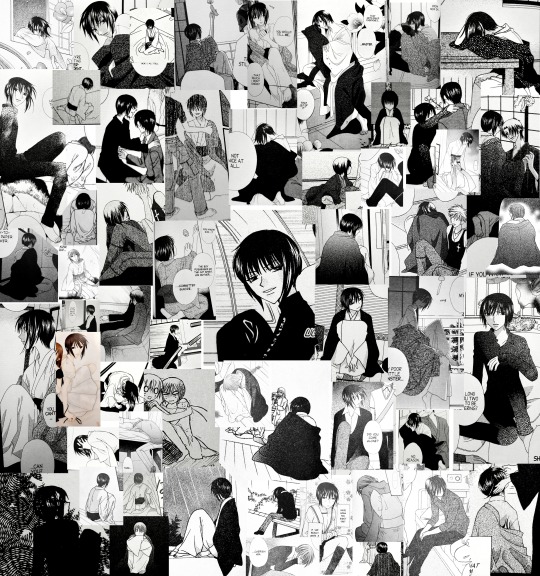
Of course this is also the isolated in a cult thing and there is a level of her purposefully doing things to intimidate but: doesn't follow a lot of social rules (overly touchy with strangers, legit doesn't get that what she's doing is wrong, ect.). Repeatedly confused when people indicate she should act otherwise without explanation. Has a breakdown when this comes to a head and approximately says that "they" shouldn't expect her to know "common sense" if "they" never explained it to her, that the way that she was was her "common sense."
Often talks in a way uncharacteristic of her age when shown as a child in a more faux mature/pretentious way. Might just be the translation and idk how to explain it but her speech as an adult also seems off from what one would normally use in conversation. Additionally, when she tries to fake being friendly in her intro chapter, it comes of as extremely stiff and unconvincing.
Generally displays behavior that could be thought of as childish as an adult, but a lot of this behavior could also read as autistic (covering ears, emotional deregulation and meltdowns, ignorance of basic social norms, ect.). It's also important to note that she knows that this behavior makes her seem younger and more helpless to the older zodiac and uses it as a manipulation tactic. Has issues regarding people treating her like a child or only hanging out with her because of pity. While she does weaponize it, we can tell that this grates on her, as seen with her finally blowing up on Kureno, which is partially triggered by the maids saying some sorta infantalizing stuff about her. Irl, a lot of autistic adults and teens struggle with being infantalized for our behavior generally or treated as little babies that can do no wrong. Even in fandom, you see people doing stuff like jumping to call autistic adult characters, such as Entrapta from Shera, "minor coded." It is also common for us to have at least one bad experience with someone hanging around us out of pity. This is something that really gave me a similar feeling in Akito's arc. She's not a baby and she can understand and do better if she is given the chance to learn and break from all the freaky cult indoctrination she's been subjected to instead of just being constantly enabled. In the end, a lot of her growth is represented by her showing that she is capable of changing and being independent.
Shows particular difficulty with socialization, often sits by herself spacing out at social events. A lot of her fear is rooted in the fact that she doesn't know how normal relationships work, becoming overly reliant on the curse because she doesn't know how to make friends.
Clings desperately onto the notion of being "special" and in some way superior to others to be worthy and to make up for perceived inherent "flaws." It's the nd gifted kid burnout vibes for me.
Easily bothered by things that don't bother others. Feels emotions very strongly to the point of getting physically ill and has bad emotional regulation.
Relatively good at reading others in an analytical sense (though has more trouble when it comes to seeing how they feel about her since she's wildly delusional) but brings up her observations in a very cold, detached way and hurts people even on the rare occasion she didn't mean to. Has extreme trouble connecting to others and understanding their point of view. This makes her come off as pretty unempathetic even though that might not fully be the case. Also thinks that people like Momiji are trying to look down on her when they try to empathize with her. A lot of why Tohru can get through to her is that she manages to convince Akito that she's not condescending by relating shared traits and experiences. As I said earlier, autistics often empathize by sharing their own experiences with someone, and I know I often have an easier time confiding in other autistics because of a fear of being seen as lesser by those that don't understand me. I think the connection between these charachters and the way that Tohru manages to reach Akito like that while others couldn't makes a lot of sense through an autistic lense!
Additionally, when Akito herself gets around to trying to help others instead of just projecting trauma, she tries to reach out to the old maid by relating back to her own experiences. This however, doesn't work.
Has "cold" emotional reactions sometimes even to things that do make her upset. For example, how sort of calm and detached she acted after her father's death can make her seem uncaring. However, we know that this event did mess her up a lot and she is still (poorly) dealing with a lot of grief from the death of her father years later.
Copies mannerisms from others, the most blatant example is with Ren, who she directly parrots lines from as a child to Yuki.
Partly just her posturing, but gestures a lot with her hands when she talks. Also seen several times clutching her hands in her hair.
Deals extremely poorly with the idea of things changing to the point that it is a driving force of the story.
Does not understand when people tease her.
Ect. Ect. Ect. Listen, I could go on for ages but just trust me, the mean gremlin lady is autistic.
#fruits basket#akito sohma#tohru honda#saki hanajima#machi kuragi#hatsuharu sohma#actually autistic#meta
196 notes
·
View notes
Text
“Your musketeer in a blue tunic” Yan! Polnareff x female reader (musketeer AU)
Hiya everyone! As promised, here is a Yan! Polnareff writing, since he was in the top four of the poll for the special but hasn’t reached the top three. I thought it might be a fun idea to make him a musketeer and now I’ve realised this fic turned out to be low-key a Belle and Gaston situation from Beauty and the Beast lmao. Anyway, there might be historical inaccuracies in the story, I’m sorry for that.
Summary: You’re a farmer woman in 18th century France and a certain musketeer keeps crossing paths with you…
TW: toxic relationship, noncon kiss, low-key harassment, forced marriage, MATURE AUDIENCE ONLY/MINORS DNI
I do not condone any yandere behaviour in real life.
Word count: 3900

“Just about half an hour and I’ll be there”, you mumble to yourself.
The pouring rain drenches your whole form, an icy cold having already nested deep in your bones. But you can’t stop now, even if it’s raining cats and dogs. You know you have to arrive to the main market place, which is located a good three hours from the farm you live in. If the wool – which you hope isn’t too wet, knowing the burlap bags aren’t protecting it well from the rain – won’t be sold today, you don’t know how you could afford some bread for your family. You think of your little siblings, how they always stare at you with big eyes, expecting at least some crumbs of stale bread in order to satiate their hunger a bit. Your heart aches painfully at that mental image. No, you’re going to sell the wool at all cost, no matter if it means you get sick due to the weather. You owe it to your loved ones, needing to protect and provide for them as the oldest sibling.
A chilly wind blows intensely into your face, making you shiver even more. Lucky for you, no other person is currently on the road, meaning you’re in safety. You’re aware about how many sketchy men lurk in these streets by the countryside, just waiting for a young woman like yourself to pass by and to do God knows what with her. As a protection measure, you always carry a knife with you, hidden in your boot. Fortunately, you haven’t needed to use it, yet…
Suddenly, you hear the footsteps of a horse approaching you, the characteristic sounds of its hooves drawing closer to you. Your first instinct is to immediately pull out your knife, but you refrain yourself.
“It’s probably just another merchant who wants to go to the market, too”, you think, comforting yourself. And even if that shouldn’t be the case, it would be wiser to take your possible aggressor by surprise with an attack if needed.
The steps are now dangerously close to you, too close for your liking, until they come to a halt. Surprised, you stop your walking as well and look up to the person on the horse. Next to you on his steed is a man around your age, probably a few years older, with peculiar silver hair and bright blue eyes. Through his uniform, consisting of a characteristic blue tunic with a white cross on it, you immediately recognise the stranger as a King’s musketeer. You hastily curtsy and meekly avert your gaze, given that he’s of a higher social rank. Why would a musketeer want from you, a farmer?
“Good day, Monsieur”, you greet the musketeer politely.
“Good day, Mademoiselle”, the stranger answers jovially. “Please forgive my intervention, but what does a young lady like you travel alone on such a dangerous road?”, he asks you, sincere concern marking his voice.
Why would he care? And why would he refer to you as a lady when you’re clearly just a commoner? You get the sudden urge to grab your knife again, but of course your rational brain side hinders you from doing so.
“I’m only going to the market place, good sir. I’d like to sell some wool”, you explain shortly, your eyes still not meeting the stranger’s.
“All alone?”, the Frenchman wonders.
“I’m afraid I don’t have much of a choice, Monsieur. My father has to work on the farm and my mother looks after my younger siblings”, you reply truthfully. Honestly, you’d prefer not giving too much information away to the stranger, but lying doesn’t seem like a safe option either.
“I see, Mademoiselle,” the musketeer utters politely, “in that case, I’d be pleased to escort you to the market place. After all, my heart couldn’t handle if something happened to a damsel.”
“Thank you for your generous offer, Monsieur”, you answer civilly, curtsying gracefully again. Though internally, you sigh and roll your eyes at the Frenchman’s words.
“More like his ego couldn’t handle getting rejected by a common woman”, you ponder cynically. You’re about to continue your walking as the stranger stops your action abruptly.
“Wait a moment, Mademoiselle,” he shouted hastily, “I’ll take your bags and settle them on my horse.” The silver-haired man dismounts from his white horse and takes the bags filled with wool from your hands, placing and tying them on the animal’s back.
“You are far too kind, Monsieur”, you say with an overly sweet voice. Lucky for you, the stranger doesn’t seem to notice the hint of sarcasm hidden in your tone. Instead, he smiles brightly at you, revealing a row of impeccable white teeth.
“As a musketeer, it’s my duty to help a lady in need”, he boasts proudly. Again, you fight the urge to roll your eyes. “Ah, how rude of me, Mademoiselle, I haven’t properly introduced myself. My name is Jean-Pierre Polnareff, I’m delighted to make your acquaintance, Miss…?”
“Y/N L/N”, you reply meekly.
“What a lovely name, Milady.”
~
The pair of you have been walking silently side by side for a while. You simply wish to arrive as fast as possible to the market place, wanting to get rid of Polnareff’s present. After some time, the stormy weather has changed into a brighter, more pleasant sky. Though some sun rays peek through the clouds, the cold from the previous rain remains. Upon seeing your slightly quivering form, Polnareff offers you a blanket he has in his supplies with him. Politely, you decline his offer. You certainly don’t want to be more in the debt of such a high ranking man.
“I apologise if this may come across as rude, Mademoiselle Y/N, but I couldn’t help but notice that there isn’t a ring on your finger”, the musketeer suddenly mentions. The hairs on your arms stand up at his observation and you instinctively straighten your back. If Polnareff has seen your discomfort, he still chooses to continue speaking. “And you’ve said previously you’re living with your family on a farm. How come such a fair maiden like you isn’t married yet? I reckon you must have many suitors.” Something about his tone and the dangerous gleam in his blue eyes sets you on edge.
“Oh, I do have had some suitors in the past,” you answer truthfully, but cautiously, “but I’ve chosen to not marry. My family needs me and I don’t wish to let them down.” Polnareff gives you a tender glance, the prying shimmer being replaced with sympathy now.
“Maybe you’ll soon find a wealthy man who’s able to help your family out”, he mumbles softly, though you still could hear his words.
“I’d rather not base my life on such an improbable dream. After all, I’m just a common farmer,” you say, slightly amused. “He doesn’t have a clue how life’s for a commoner, does he?”
“So you’d like to marry? It’s your dream, didn’t you say that, Mademoiselle?”, Polnareff counters, hope swinging in his voice. Why is he hopeful? But you decide to not voice this thought.
“Well, that’s quite a difficult question, Monsieur Polnareff,” you retort, feeling unsure now “it would be the wisest choice for me to marry, but at the moment, I feel content to take care of my family.” For some reason, the musketeer’s face falls at your last sentence. Disappointment takes over it instead, his lips turning into a bitter, thin line.
“Ah, I see”, he replies wearily. You immediately notice the change of atmosphere, though you don’t comment on it. Instead, you two continue strolling in silence.
Eventually, the pair of you arrive at the market place. During your travel, none of you spoke further, the mood being too tense and awkward. You settle your burlap bags on the floor on a free spot after the silver-haired man has removed them from his horse for you.
“My sincerest thanks, Monsieur Polnareff.” You bow politely. Even though your eyes have been trained on the floor for only a matter of seconds, some stealthy thief has been able to snatch one of your bags. Immediately, your head leaps up.
“Hey, this belongs to me! Give it back!”, you scream angrily. You wouldn’t let some trickster take your wool, not after working so hard for your family! You’re ready to run after the knave, but a hand on your forearm hinders you from doing so.
“Let me handle this, Mademoiselle Y/N,” Polnareff says confidently, “you’ll have your merchandise back in no time. Just wait for me here.” Quickly, the musketeer dashes into an alleyway after the thief. Confused, you’re left alone at the market place, the man’s horse being your only companion. A sigh rolls off your lips.
“Guess I’ll have to do what he says if I ever want that wool back”, you exclaim exasperatedly. This is the last thing you’ve needed today. First, you’ve been drenched by the rain, then a weird musketeer has started following you and asking you eerily invasive question and now your precious goods have been stolen. In the meantime, you try your best to sell the remaining wool.
After half an hour, you still haven’t sold any wool at all. Though you were definitely drawing attention on you by shouting out some offers, no one has seemed to be interested yet. No one even cared enough to look towards your direction.
“I guess I’ll just have to stay all day, then”, you think gloomily. From the corner of your eyes, you notice an all too familiar form approaching you, though this time with a bag in his hand.
“Mademoiselle Y/N!”, Polnareff shouts excitedly, “I’ve retrieved your bag from the thief!” A sincere expression of gratitude appears on your face. Yes, the man is more than annoying to you with his clingy behaviour, but at least he was chasing the trickster for you!
“Thank you so much, Monsieur Polnareff!”, you exclaim happily, relieved to have your wool back. Now there’s only the matter of selling it left…
“Of course, nothing to thank for, Mademoiselle! I’d never want to see such a charming lady like you in need.”
Purposefully, you ignore his statement, an awkward feeling bubbling up in you. Instead you’re thanking him again. All the while, the Frenchman keeps staring at you with a look of fondness, a huge and proud smile adorning his face. In his mind, he’s just proven to you how capable he is of taking care of you and your family. How could you refuse him now? He’s literally your knight in shining armour! Or your musketeer in a blue tunic. It doesn’t matter, he’s practically your hero!
Polnareff’s grin only widens at the thought of you swooning over him. The silver-haired man doesn’t know why he feels like this towards you. Maybe it’s because you just looked so pitiful when he saw you on that road, soaking wet from the rain. Maybe it’s his pride that doesn’t let him relent. Maybe it’s the way your eyes sparked with determination and love when you talked about your family. Maybe it’s your radiant atmosphere, which draws him in like a moth. Maybe you’re secretly a witch who put a love spell on his poor self, making him a fool for you after having only met you. Maybe, maybe, maybe…
Polnareff quickly stops his pondering. “It’s not of importance,” he muses, “as long as she’ll realise I’m the best choice for her.”
“I see you haven’t sold any of your goods yet”, the musketeer says, trying to sound casually. Though in his thoughts, he already has a plan schemed.
“No, unfortunately not,” you reply, an exasperated sigh following swiftly, “but there’s still some time left until I have to return home. Surely, I’ll be able to sell some.”
“You know, Mademoiselle Y/N, I’d rather not see you standing here all day, maybe even for it to be in vain,” Polnareff utters, concerning coating his voice, “let me help you, I’ll buy the wool.” Your eyes grow big at his proposition. Even though it’s more than a generous offer, especially after all he’s been through for you today, you can’t help but feeling alerted. Why would he go all these lengths for you? He can’t be that kind, there must be something he wants in return.
“You’re far too generous, Monsieur Polnareff. I can’t accept such an offer”, you tell the musketeer, hoping he’ll actually drop his suggestion. But the Frenchman remains stubborn as a mule.
“Ah ah Mademoiselle,” he tuts you condescendingly, “I’m a man of my word. How much would you like? Are two livres enough?”
Your eyes widen so much at his offer, you wouldn’t be surprised if your eyeballs fell out. Two livres? Is that man insane? The wool is hardly five sous worth!
“I think you must have meant two sous, Monsieur Polnareff,” you answer him, still shocked.
“Pas du tout, Mademoiselle. Two livres is what I said and what I meant. Or would you maybe want more?”
Vehemently, you shake your head. Two livres… That would feed your family for at least three months! “No Y/N, you can’t take this offer!” Your thoughts interrupt you suddenly. Not only does your conscience forbid you from doing so, your parents would also wonder where all that money comes from. They might assume you’ve stolen it as no one would believe a stranger to be so kind to just give a random farmer way too much money.
“Monsieur Polnareff,” you try again to change his mind, “I really don’t think you should-“
“Ah, there’s my pouch!”, the silver-haired man exclaims happily, ignoring your previous words. Eagerly, he takes two shiny coins out of it, pressing them in your palm. Admitting your defeat, you curtsy and express your deep gratitude again. Though a small part inside you does enjoy the fact of getting provided for.
After your exchange, Polnareff insisted on bringing you home again. You dislike the idea of him knowing exactly where you live, but that man’s stubbornness and pride is bigger than the Palace of Versailles. Which is why the two of you are walking back to your farm, the wool resting on Polnareff’s horse’s back.
“What are you doing with all the wool, if I may ask?”, you say with a questioning look on your face, “Surely, a musketeer doesn’t need to fabricate his own clothes.” The Frenchman rubs sheepishly behind his neck and offers you a smile.
“Ah Mademoiselle, you see, I might just donate it. I’ve just wanted to help you out, I don’t need it myself.” Even though you still cannot bring yourself to trust him, your heart warms at his statement.
“That’s indeed very noble of you, Monsieur Polnareff”, you reply candidly. The musketeer sends you another bright grin, a subtle blush forming on his pale cheeks.
The sun has begun to set as the two of you arrive on the farm. With a polite curtsy, you’re ready to finally return home, excited to tell your family the good news regarding the money. But Polnareff stops your goodbye. His hand finds its way to your wrist, halting your movement.
“Before we must depart, Mademoiselle Y/N,” he counters hastily, “I’d like to be assured that we’ll meet again soon. I find myself enthralled by your presence.”
Your heart beats faster at his proposition. Suddenly, you realise the dangerous situation you’re in, the big hand capturing your smaller wrist. Could you really deny him without facing consequences? Thoughts like these rush through your head as the man in front of you keeps waiting for your reaction. Still, you’re going to try. If something should happen, you still have your knife with you and your father would surely rush out once he hears your screams.
“Monsieur Polnareff,” you start hesitantly, “I’m deeply flattered by your words. You are truly an admirable and honourable man whose kind actions shall always carry my most sincere gratitude. Though I must admit, I don’t think it would be a wise idea to meet again.” The Frenchman makes a crestfallen face at your words. You feel almost bad for him. “Ah, I think I should explain myself further. Well, Monsieur Polnareff, we are of two different social classes, continuing mingling with me would put a bad reputation on you. I cannot offer you something of interest. Plus, I like staying with my family so far, this is my home.”
“Y/N”, Polnareff whispers affectionately, his thumb rubbing softly on the inside of your wrist. You shoot him a surprised look, confused by him dropping the formal title. If anyone would have heard this, they’d turn it into a scandal.
“I know my offer might appear strange to you, but I wish to marry out of love one day. I’m aware it’s fairly uncommon and even looked upon with scorn to marry below someone’s station, but the matters of the heart outshine the matters of the mind in my case. I have more than enough money, a comfortable estate and an honourable title. So you’re correct by saying you can’t offer me anything. Though you forgot one important thing, dear Y/N: you can offer me companionship, love, a meaningful bond between two souls.” Upon his last sentence, Polnareff tenderly grabs both of your hands in his, admiring how they seem to fit perfectly. Too astounded by his words, you let the man do as he pleases. Quickly, Polnareff catches on with his speech. “Please Y/N, let me see you again. Let me court you properly. I can give you and your family a beautiful life, a life you deserve.” The silver-haired male’s form moves now closer to yours, his blue eyes fixated on your lips. This action breaks you from the spell you’ve been caught in previously as you abruptly rip your hands off his grip and step back.
“I’m sorry, Monsieur Polnareff,” you manage to say, your voice sounding breathless from the adrenaline rushing in your veins, “I don’t think I’m the right woman for you. I do not wish to disappoint you further, that’s why I’m being direct with you. I’m going home now, please do not seek out for me. Have a good evening, Monsieur Polnareff.” You give him one last glance, noting his furious facial expression, before you eventually walk rapidly the path up to your family’s farm.
“I’ll be coming back, Mademoiselle Y/N!”, you hear the musketeer shouting behind you, “I’m not giving up that easily!” His sentences only make you pick up your pace as fear makes itself present in your body. Why couldn’t he just respect your choice? You’re sure there are enough suitable ladies in his rank pining for him, so why would he bother you? Finally, to your happiness, you arrive at the front door. Quickly, you enter your home, locking the door from the inside. Still, it feels as if a pair of blue eyes continues burning holes in your back…
The following month had been both positive and negative. Positive, because your family didn’t need to worry about food thanks to the two livres Polnareff gave you. Negative, because the latter had been true to his word and kept showing up at your place. Every time you told him you won’t change your mind, the musketeer only seemed to be more encouraged to prove you otherwise.
Today isn’t any different. As you make your way to the market to buy some food, you hear the familiar hooves approaching you. Annoyed, you let out a sigh and roll your eyes.
“Bonjour Y/N! What a pleasant day to see you again, mon amour!”, Polnareff exclaims happily while he dismounts from his horse to walk next to you.
“Bonjour Polnareff”, you reply politely. In the meantime, you’ve dropped the titles when you two were alone, not seeing the point of them anymore. Plus, the Frenchman even decides to call you pet names, so why showing him respect?
“Ah, ma puce, no need to be so cold today! After all, I bring some splendid news”, the Frenchman replies excitedly. You eye him suspiciously, brows knitted together. What on earth is he planning now?
“And that would be?”, you answer matter-of-factly. “You’re finally leaving me alone?”
“You see, before I came to meet you, I’ve finally talked with your parents.” At these words, you immediately stop your steps. A feeling of dread emerges in your stomach, making you feel sick.
“Oh no,” you think desperately, “this can’t be good.”
“Very lovely people, indeed. It hurts my feelings knowing you haven’t invited me to them, mon cœur”, Polnareff continues his talk, a hand put on his chest in mock concern.
“And why should I have done such thing?”, you reply coolly, though internally you’re freaking out. You already know you won’t like the answer…
“My dearest, how come you act so cruel? Don’t you think your future husband should see your parents? After all, we’re betrothed now!”
“No”, you retort without thinking. Your palms grow sweaty, a deep fear manifesting in your body. The silver-haired man smirks at your reaction.
“Non? I think your parents disagree with you, ma chérie. In fact, we’ve already picked out a date for the ceremony. Can you believe it? In two months, we’ll be finally one.” Panic overflows your mind, your breathing becoming laboured. How could your parents decide on such a matter behind your bag? After everything you’ve done for your family? Polnareff notices your stress as he softly wraps his arms around your waist and pulls you close to his chest. The musketeer tries to comfort you by shushing you and gently brushing over your back, though his actions only fuel your terror. You squirm in his grasp, trying to escape him, escape this situation, but his grip on you only strengthens.
“Let me go!”, you scream all while tears stream down your cheeks, “I don’t want to be with you! Why can’t you just accept that?”
“My little Y/N,” Polnareff mumbles calmly, “if you hadn’t been so stubborn, we could have discussed the wedding plans together. I know you think our union is not favourable, but if even your family agrees to it, it surely can’t be that wrong, hm? You’re so blinded by your little provincial life that you can’t see what’s best for you. And trust me, my dove, I’m the best choice.” The Frenchman grabs your chin, staring lovingly in your by now puffy eyes. “It’s fine if you need some time to realise that. As long as you remain by my side.” With these words, the silver-haired man puts his mouth on yours, his hand now wandering to your cheek. You wriggle harder in his grasp, though your attempts to escape remain futile. Tenderly, Polnareff caresses your face as his lips finally leave yours.
“Je t’aime de tout mon cœur, mon ange*”, he whispers adoringly, pressing your face against his chest again. Your tears smudge the blue fabric of his tunic, your voice hoarse from screaming. And even though you wish this is but a nightmare, you start comprehending you’re truly trapped in Polnareff’s oh so loving arms for the rest of your life.
*former French currency. 2 livres are about 30 euros, which was a lot of money back then
*former French currency. 5 sous are about 3,70 euros, which was still quite some money back in the day
*”I love you with all my heart, my angel”
#JJBA#JoJo's Bizarre Adventure#yandere jojo#yandere jjba#yandere x reader#yandere jjba x reader#yandere polnareff#yandere polnareff x reader#minors dni#tw: yandere#tw: arranged marriage#tw: noncon touching
138 notes
·
View notes
Note
ALSO CAN I ASK FOR SOME RANDOM GOM HCS U HAVE? like just random ones u have or if u want like some toxic hcs abt them :D
I’m assuming that I can include their negative traits of their personalities as well 👀 Also including Momoi in this… lots of analyzing for this hc, so I used my brain here pls appreciate AGAIN these are all headcanons/interpretations of possible toxic hcs about them and only a few are canon
[Headcanons]
Kuroko Tetsuya
Kuroko is the hardest person to find a “negative/toxic” trait in, and it doesn’t seem like he has any
kind, understanding, hardworking, and compassionate; he’s everything a good-natured protagonist is
but he’s only like this to people/hobbies he cares about/close with; anything else he’s quite apathetic and also very passive/neutral about
the biggest hint to this is when Akashi criticizes Kuroko for cherry-picking who the GoMs should “go all out against” and who to casually toy with
and Akashi is absolutely correct
most of the series is portrayed through Kuroko’s perspective, and Akashi is the first direct outside perspective who comments on his actions/attitude
it’s obviously not that Kuroko didn’t “notice”... he clearly sees and knows what these GoMs are doing; after all, he had a conversation with Aomine about how observant he is to everything around him
of course, if you were close to him, all your opinions and issues matter to him
it’s the fact that what’s not really important to him is suddenly now important just because someone he knows is involved
just an example: if someone was advocating climate change, he has no opinion on it until someone he knows cares about the issue
in other words, he has a subtle hypocritical view on things, especially when he interacts with others
another clear negative trait could be that he’s too idealistic or perhaps naive, seeing things in a clear black-or-white picture and not necessarily a gray area
WE know, as an audience, that the GoMs honestly needed therapy and a proper adult to guide their out-of-control talents
but Kuroko, in his eyes, had viewed them as “bad” and “evil” in their ways of basketball until they changed after their respective matches
he’s probably someone who doesn’t yield to other opinions once he forms his own, and this may make him unable to consider things in other people’s perspectives
which is again, ironic: someone who doesn’t have generally a strong stance but once they do, it’s very unyielding, which further proves Akashi’s comment about Kuroko’s tendency to nitpick which to care about
a final hc about a potential flaw he might have here in a different ask!
Kise Ryota
y’all… it’s as canon as day that he has a mean side
straight from the author himself, it’s confirmed that Kise is only kind to those who he respects, and to the rest, he’s cold-hearted
in the manga, it’s very clear that he’s super judgmental on every first impression on people he meets, boxing them into categories based on the way they look, act, and speak
only when they surpass his preset expectations (low or high depends on his preliminary judgments of them) is when he opens his mind to the rest of their personality
this is a very close-minded way of thinking, and I hope I don’t need to explain why LOL
this can be interpreted as him being two-faced by the majority of the people in his school
his way of speaking can definitely be very cruel and crass, and to sensitive people, his words can easily shatter hearts
Kise’s negative/toxic traits are pretty straightforward here, so let’s move on
Midorima Shintarou
his harsh words can be considered a “negative” part of his personality, but I think it’s a lot more than just that
it’s confirmed in the series that he’s a bystander and almost always minds his own business
on one hand, one can say he’s self-driven and that he constantly strives for self-improvement
on the other, it can be interpreted as him being very dangerously ambitious and selfish, in which most actions he takes are for the sole reason of self-improvement and not for altruistic reasons
for example, when he helped Kuroko and Kagami in the training camp, it was under the reasoning that them becoming stronger would be a good challenge for himself to test and learn
that’s not to say that he can’t have friends, but most friendships he’s built are with capable people who can potentially provide him with some new beneficial skill/goal to strive towards
after all, he’s only learned to trust Takao as a friend only after seeing him as someone capable
because he’s so focused on himself, he’s extremely likely to turn a blind eye to injustice, most also likely to use Oha Asa to justify their “misfortunes” as he continues on his day
he’s not cold-hearted, but altruism comes by Midorima a lot rarer than the average person
now, we know that his Oha Asa aspect is used to balance his serious side as the “comedic side” of him, but if we really think about it, his obsessions with the horoscopes could be a huge obstacle in the future, where he may refuse to listen/depend on others in favor of his own intuition and the stars; after all, no one knows everything, and depending on the stars as one’s next source of advice and guidance isn’t a sound decision to commit themselves to
he seems like the person who overthinks and jumps to conclusions when it comes to social situations, but instead of confronting the person, he turns to fate and fortune if Takao isn’t near to help
Aomine Daiki
I wouldn’t be surprised if Aomine had a skewed sense of beauty standards from all those magazines he consumed and from being around Momoi for the majority of his life
of course anyone can distinguish pieces of media from reality, but during the most impressionable years of life, without experiencing other types of people and physiques, he would have limited knowledge on what “beauty” is and whatnot
this probably would be more of a problem in his adolescence than adult
a very given negative trait is his short temper plus his tendency to turn to physical violence when someone nags him to a certain point, seen with how he’s treated Wakamatsu in the beginning (though this seems to almost disappear by the end of the series)
what I’ve noticed in every scene he’s in, is that everything seems to revolve around him and his hobbies of basketball and Japanese idols
what I mean is that everytime we see Aomine, it’s always Momoi approaching to Aomine or just him always being the center of attention; never once has he approached Momoi for anything and it’s always been the other way around
in other words, people have to cater to him in order to get along with him/be in good graces (additional example: Imayoshi letting him do as he pleases to get him to be cooperative and participate in the games)
we’ve actually never seen Momoi’s hobbies outside of being a manager for her basketball teams and just anything basketball-related
he can be quite apathetic, choosing to only pay attention and try in things he’s interested in… which is basketball and those magazines
he seems to mature in the Last Game though, so I’m not quite sure to what extent these headcanons would apply to older Aomine (these also don’t really apply to Puremine)
Momoi Satsuki
the author probably also included this type of anime trope as comedy, but belittling another female for her body is definitely a no-go in reality; I feel like this is something most people gloss over really lightly
her body comments on Riko are actually what made me skeptical of her character at first before the show really shows her entire personality
that being said, it seems that she always takes the opportunity to look down on other girls (especially to those she is a stranger to) as a sort of “competition” when there’s boys around
definitely at certain moments, she screams a “pick-me girl” type of person (real phenomenon, you can search this up!)
while Kuroko doesn’t seem to actively mind this, I think she also has no good sense of boundaries and what’s considered appropriate touch and consent; people can chalk this up to “oh it’s just infatuation,” but this definitely isn’t okay if we really think about this
her life also seems to revolve around either Aomine or Kuroko, and based from that, I’d feel like she’d have a difficult time forming her own identity/life separate from her “manager life,” especially once she graduates from Touou
can definitely be interpreted as too clingy at certain moments, while others may think it’s her way of showing that she cares
Murasakibara Atsushi
most people would chalk up Murasakibara as “lazy,” and on the surface level, it does appear to look that way…
I think his true negative trait is that he has a lack of intrinsic motivations to drive him to do things
it’s different from being lazy; someone can be lazy while still having a goal, and certainly someone can be lazy while they’re motivated by thoughts of “I want to learn more,” “I want to get stronger,” etc. (you guys, it’s me right now in college)
and he doesn’t have that
part of this was contributed to the fact that he’s already so gifted with genetics and thus, there’s never been a goal for him to have to work towards to when he’s already at the top
he doesn’t actively seek out, and while that may be a characteristic of sloth, it’s not exactly right either
he willingly does things if people around him give him the motivations/reasons to do so; a person of sloth wouldn’t do anything even with all the motivations and goals handed right to their face
snacks/food are examples of extrinsic motivations that fuel him to carry on daily life
Himuro is always the main motivator for Murasakibara to come out and watch matches, and he also does whatever Akashi orders in both Teiko and present days // a person who can give the giant the motivation to do tasks would get along with him the most
searching out for a challenge against his basketball skills is something that’s never crossed his mind
why? he grew to be like the way he is because of the lack of results from his “search” of a challenge throughout his games
again, it’s only when Murasakibara gets handed a silver-platter of a challenge, Jason Silver, that actively gets him pumped up and raring to go
as such, Murasakibara is equivalent to a rusty machine, extremely difficult to start up and find compatibility with, but very powerful and efficient once he finds that spark
Murasakibara finding any partner or friend in the future would be extremely difficult because he ticks a different tune from the rest
Akashi Seijuro
his entire Bokushi side was a giant-ass red flag for very obvious reasons LOL anyways, moving on…
it’s difficult to pinpoint a negative characteristic for Oreshi because he’s the pinnacle of a gentleman character… but that technically is also his negative trait
for him to maintain that perfect image for himself and others, he has always carried himself in such a way that doesn’t allow for errors or expressions of “weakness”
thus, bottling up his frustrations and emotions to the point of no return is something very familiar to Akashi, and I’d feel like Bokushi is the result of his overflowing emotions left unchecked in the first place
I also predict that if Akashi continues to carry himself without letting himself wind down and feel emotions on the spot rather than locking it up inside him, a day will come when he splits into two halves again with a “new” Bokushi to deal with his current life (and let the current Oreshi take a backseat in his psyche to take a break from the turmoil)
also will tend to overwork himself to manage people’s expectations as well as his own, and he’s not one to depend on people not because he sees them as inferior or incapable, but because he’s doing this out of habit from being in positions of authority and responsibility for much of his life
and so, he may tend to hide important things or just not speak about his problems in general to those close to him because he feels like he can do it all himself and spare everyone the work and stress associated with them (a leader mentality)
throughout the majority of his life being calm and calculated, his emotions would definitely escape from him in forms of uncontrollable lashes of anger… before he would realize what he’s done… that is, assuming that another Bokushi hasn’t form within his subconscious yet
#knb#knb headcanon#knb headcanons#kuroko no basket#generation of miracles#gom#teiko#teiko middle school#knb teiko#kuroko tetsuya#kise ryota#kise ryouta#midorima shintarou#midorima shintaro#aomine daiki#momoi satsuki#murasakibara#murasakibara atsushi#akashi seijuro#akashi seijirou
294 notes
·
View notes
Note
What do you think of Rowan, Ben, Penny and Merula's Patronus? Though I don't like Merula very much, I still think she is able to conjure one.
I’m putting it under the cut because it turned out a bit lengthy.
Rowan
I used to think of an Owl for Rowan because, y’know, it's “a symbol of wisdom” and all. But when I got this ask, I remembered that I found the site on Irish Astrology just days earlier – the same Rowling was using for birthdates and wand wood of the Golden Trio. Interestingly, each sign has assigned an animal there, and since the rowan tree is one of them, I decided to check it to find out that it’s a crane or a green dragon. A dragon makes me think of Charlie, but I did a little bit of digging on another option, and I have to say – I think I’m gonna stick with a Crane Patronus for Rowan.
This is what I found on the Crane symbolism:
Throughout Asia, the crane is considered as a bird of happiness and prosperity. The Japanese, Chinese, and Korean traditions relate it to longevity and fidelity.
Aristotle wrote about this bird that it always held a stone in its mouth so that if it fell asleep and the stone would fall down, the bird would wake. Thus crane symbolism came to be linked with vigilance.
I also checked Indian symbolism since Rowan is part Indian, and I found this:
[The Sarus crane] is also known as the eternal symbol of unconditional love and devotion and good fortune.
Interestingly, cranes are monogamous and they mate for life. That’s actually why in Japan, they’re often incorporated in wedding décor!
Overall, we have pretty positive symbolism. The parts about devotion and unconditional love sum Rowan up as a friend pretty well. We also have a part about vigilance which again is pretty fitting for Rowan who was probably the most aware from all of our friends that MC is indeed in constant danger – and that’s why they were suspicious of Ben (not because they simply didn’t like Ben – let’s remember that Rowan and Ben were friends at the end of a day).
Admittedly, “in some cultures, the meanings of crane birds can be negative: they represent deception, a harbinger of death, and even the symbol of the devil.” However, it’s actually a bit meta, considering all the people suspecting Rowan of being a traitor.

Ben
I really like the idea of a Lion Patronus for Ben. A Patronus form is not only about representing one’s personality, but also “the Patronus represents that which is hidden, unknown but necessary within the personality” - and it fits Ben’s bravery so nicely. I talk here mostly about Old Ben, but that’s also a pretty old idea of mine. I mean, Ben was always super brave when his friends needed it, he just couldn’t really accept it himself. I also find it kind of heart-warming to imagine Old Ben being intimidated by his own Patronus at first, only to become more and more comfortable around it with time.
Another thing, I remember reading once someone else’s point that it could be a funny reference to the Cowardly Lion from The Wizard of Oz – which, now that I think about it, Ben would be probably familiar with as a Muggleborn!
Now, as for New Ben… Well, honestly, I don’t think that Ben would be able to cast Patronus Charm at this very moment. He probably still feels too much guilt for Rowan’s death and whatnot. Still, I remembered a discussion I had with my friend after Rakepick’s Patronus was finally revealed, and she pointed out then that male lions tend to kill little cubs if they defeat a previous male lion and take over his pack. Y’know, to eliminate wrong genes. And you know what? It’s kind of what Ben did with his old self. Before the end of Y5, Ben had a pretty good understanding of bravery. There was that very sweet moment in the O.W.L.s TLSQ, for example:
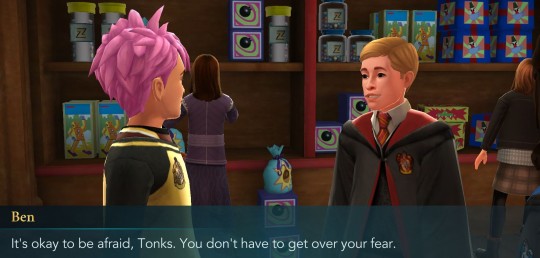

But then, the end of Y5 happened, and Ben was like: “Nope. I know no fear and THAT’S bravery”.
Either way, I do hope that Ben will eventually return on his path of a healthy balance between his old and new self, and I have a feeling that a Lion would still be a pretty good match then.

Penny
Probably an unpopular opinion, but I always thought that Penny’s Patronus should be some kind of a predator. I once even proposed a Black Panther, but I didn’t have a lot of reasoning behind it, to be honest. Now, I think I’m gonna change it anyway, and I’ll say that Penny would have a Fox Patronus. This is information I found on it:
The fox is a natural trickster, and brilliantly charismatic. Those with this Patronus are often more reserved, but do have the social capability to speak to just about anyone. They are strongly ambitious and observant of the behaviour of others, watching key points in what others do and storing them for further reference, when they may need them. They are good talkers, meaning they can convince people to do what they want and make them think it was their idea in the first place.
Foxes are quick, intelligent and strongly ambitious. Although they are known for their cunning nature, they are very charismatic and easy to love. If your Patronus is a fox, you have an ability to think outside of the box and act quickly during emergency situations.
Penny is insanely ambitious about her Potions-making. She said on more than one occasion that she couldn’t pass the opportunity to brew more advanced Potion. She’s also obviously charismatic, and the part I might like the most is about “making others do what they want and even make them think it was their idea”. Because when you really think about it… it’s exactly Penny.
Like, making MC steal the ingredients for the Forgetfulness Potion and very similar situation again with the Draught of Peace (each time not even telling MC what it’s about until the very end). Making MC impersonate a Professor or a Prefect. All those situations could get us in pretty serious trouble. Yet, the best example in all of that is the Animagus TLSQ, in my opinion.
The quest started with the rumours that Talbott is planning to become an Animagus, and so MC got intrigued and decided to help Talbott get ingredients, hoping that Penny could make an extra Potion for them. But then, it turned out that Penny doesn’t make the Potion for Talbott at all, and she wanted MC to take it instead. Moreover, Talbott was already an Animagus, so the whole story didn’t really make much sense from the very beginning. Now, it might be the case of Jam City screwing up badly in writing, but it doesn’t change the fact that this is basically what happened: Penny wanted to brew the Animagus Potion, so she sent Talbott to get MC intrigued in the whole thing, so MC thought it was their idea while Penny could brew her Potion. Now, tell me she’s not a Fox – especially that again it could’ve been pretty dangerous for MC if anything went wrong.
There’s also a part about thinking outside of the box and acting quickly during the emergency, and funnily enough, it’s also kind of true for Penny. The thing is that she doesn’t act well in those situations – but that’s a separate problem.
Also, I don’t know if you can tell it by now, but I totally believe that Penny should’ve been a Slytherin, and I will die on that hill. Just a digression.

Merula
Hm, how about a Mole? Or a Rat? :D Just kidding, of course. Mostly…
Seriously though, I had a bit of a problem with Merula. I thought of a Skunk or a Frilled-neck lizard at first, y’know, because they try to look more threatening as a self-defence mechanism. I considered a Yorkshire Terrier as well because they’re always yapping at bigger dogs. And while they kind of fit Merula, they’re definitely not perfect matches. Merula has no dog qualities whatsoever, and even though her aggression is probably caused by a lot of insecurities, skunks and frilled-neck lizards don’t really harm whatever threatens them. Merula does harm, whether physically or emotionally, and she’s pretty calculated in that.
So, I kept thinking about something else, and there was one option I was coming back to. And even though I didn’t fully like it at first, I think I’ll stick to it, and I’ll say that Merula would have a Black Mamba Patronus.
Here’s some information about Black Mambas:
Cloaked in the color of death and measuring over 14 feet in length, the Black Mamba is regarded as one of the most vicious snakes in the world. It’s also one of the most venomous. (…) Unlike many animals, which simply have an anger problem, Black Mambas are driven by an extreme form of fear-based aggression. Being exceedingly nervous, the slightest sense that the snake’s escape route is compromised may unleash an attack of unparalleled ferocity.
There’s also an interesting quote from the discussion on whether or not they chase humans:
No, they absolutely don’t chase humans. No snakes chase humans. However black mambas are so high-strung they’re practically hysterical the moment something makes them nervous, and they’re really not very intelligent. As a result, these snakes are extremely prone to absolute panic. If you corner a mamba, its fight/flight reflex is triggered, and it will freak out and try to fight you to escape. This involves wildly throwing itself around and biting you like 60 times in a row, if you don’t get the blazes out of the way. (…) And they’re not very good at evaluating the level of danger they’re in. Or… much of anything.
… and that’s basically Merula. She’s in a constant state of panic that people are better than her. Especially in earlier years, she constantly felt threatened by MC’s mere existence, even when MC was clear they just don’t care about her – so she was attacking. All. The. Freaking. Time.
Moreover, snakes in general are often associated with deceit, so there’s that.
Of course, there’s also much more positive symbolism around snakes, like a rebirth, transformation, or heling. And while I have no doubts that Jam City won’t give Merula a proper redemption arc (because they're too lazy about it), she clearly is a character who’s supposed to be all about redemption. So, I guess that’s another reason why a Black Mamba would fit nicely, even though it seems a bit stereotypical for a Slytherin (then again, Merula totally should’ve been a Gryffindor, but that’s a topic for a different discussion).

#long post#hogwarts mystery#hphm#rowan khanna#ben copper#penny haywood#merula snyde#patronus#about characters#ask#anonymous
46 notes
·
View notes
Text
My Nitpick Issue with Sherlock in Moriarty the Patriot
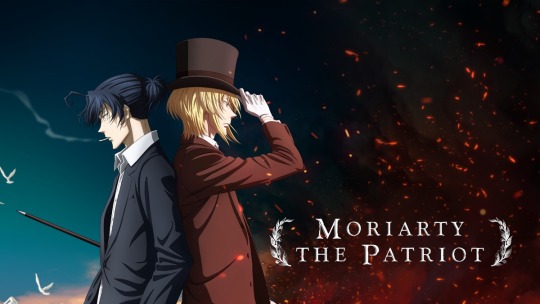
By: Peggy Sue Wood | @pswediting
It may surprise some of you to know that I have degrees in book reading and writing. While earning those degrees I studied one specific time period more than the others--that being British Literature from late-17th/18th century through the early 20th century. This is to say that it is a time period I know a little more about than you might think. And early 1900s is probably my favorite period out of that timeline, particularly England under Victoria’s rule.
And, perhaps, because of this strange obsession I have with the period, I presently have a small bone to pick over Moriarty the Patriot.
It’s not the minor inaccuracies of the clothes, nor the adaptation of character designs. It’s not even the adjustment to social tendencies depicted that are more Japanese than British-English of any period thus far either--because those kinds of things happen frequently in adaptations. And it's not Moriarty or his backstory too! Because, again, this is an adaptation, and liberties will be taken to fit the new story (besides, even in the original works by Doyle the man’s backstory was inconsistent).
My issue is with the character of Sherlock and his supposed “deductions.” Well, maybe more accurately it's with the writing of Sherlock.
You see, Sherlock is almost always introduced the same way in an adaptation. He makes a judgment about someone (usually about Watson or the Watson stand-in) and then proves it using his observational skills. This introduction is important because it clarifies that the world of the characters is one based on where common sense and science not only work but make sense. His deductions are logical and based on some semblance of rationality. Here is an excerpt from the original novel:
“I knew you came from Afghanistan. From long habit the train of thoughts ran so swiftly through my mind, that I arrived at the conclusion without being conscious of intermediate steps. There were such steps, however. The train of reasoning ran, `Here is a gentleman of a medical type, but with the air of a military man. Clearly an army doctor, then. He has just come from the tropics, for his face is dark, and that is not the natural tint of his skin, for his wrists are fair. He has undergone hardship and sickness, as his haggard face says clearly. His left arm has been injured. He holds it in a stiff and unnatural manner. Where in the tropics could an English army doctor have seen much hardship and got his arm wounded? Clearly in Afghanistan.'
How does this prove we are in a world where common sense and logic works? Well, because he didn’t pull any of these deductions from thin air. He just used his eyes and common knowledge to make a quick judgment.
In the example above, everything that Sherlock assumes is true and based on reasonable assumptions about the time period and about what he can observe of the person before him.
The tan of Watson’s skin is something he notes because London is usually dark and wet around this season, so you’re unlikely to get a tan. The way the man walks and stands is also a thing he can observe, and fresh military men walk very differently from the average citizen or gentleman. These two observations, coupled with noticeable injury and limp could lead one to think that maybe he has just come back from the current war (the First Anglo-Afghan War). Of course, maybe he wasn’t injured in the war at all--maybe something else happened; however, you can make a pretty good guess that an abled bodied soldier would not be home and looking for a room in the middle of war-times if something hadn’t happened to him on the battlefield.
My point is that all of Sherlock’s deductions come from observing details, paying attention to the basics of the world (such as the ongoing war or understanding rigor mortis), and using your senses. Sure, there may be a few things the average person doesn’t know that Sherlock does, but that’s because Sherlock has studied different things and to a more serious degree. The level of understanding is different, but not impossible to achieve in one’s own time or effort. And, as another note, Sherlock is not perfectly observant all of the time. There are plenty of examples of him needing to take breaks, of him closing his eyes to block out distractions so he can better focus on what someone is saying, and of him smoking to zone out for a bit so that he can come back to a problem with fresh eyes at a later time.
It’s absolutely vital to Sherlock’s character, and the original story, that all of the deductions are based on the “possible,” which is why the introduction of Sherlock in Episode 6 of this adaptation immediately irritated me. Here is the scene:
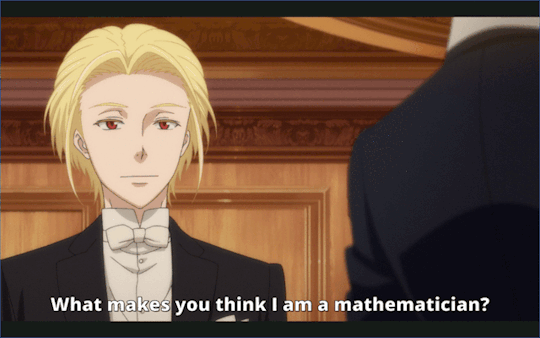
Side note: I’m sorry it’s shown as a poorly made gif--I literally could not find a copy of the clip with English subtitles on YouTube so I could not include it as a video. If you want to look at it in the episode itself, it starts at about the 13:00 minute mark. EPISODE LINK)
Here is what bothers me so much. Why would a mathematician be checking to see if the staircase on a ship fits the golden ratio? More importantly, why would that in any way matter to Moriarty as a character? Based on what we’ve seen so far of this character, and we’ve had 6 and 1/2 episodes to define him so far, none of Sherlock’s statement makes sense here.
Like, at all. (And I know that this also happens in the manga--doesn’t make sense there either.)
You know what would make sense though? For the time period and the character development we’ve seen of Moriarty thus far? A pause to consider-- and maybe even compare--staircases on the ship between the main steps for passengers and the steps for commoners or staff.
Why would that make sense? Oh, thank you so much for asking. Time to get real nerdy here for a minute:
Class issues were a serious problem in Victorian England (as they are now, though in a different way). These issues were not necessarily the same as depicted in the show but it was still consistently present throughout the society as a whole. (A good, short read on the subject can be found here for those of you interested: Social Life in Victorian England.)
One way that this issue came out was in the very architecture of homes. In Victorian England, nobleman homes and estates were built with main staircases, where the residents and guests walked, and servent staircases, where the staff and other temporary employees walked. The difference in these stairs was huge, as the servant staircases were basically death traps.
In the late 1800s, a mathematician (and architect) named Peter Nickolson figured out the exact measurements that would generally ensure a comfortable and easy walk upstairs:

BTW: Here is a great video on the subject and how they were death traps: Staircases in Victorian England
However, Nickolson’s math and designs were not used regularly in the design of houses for years to come.
By the setting of the story, and given Moriarty’s interest in maths, his understanding of class issues, and beyond--this kind of knowledge would make far more sense than searching for the golden ratio in a man-made set of stairs.
Moreover, the golden ratio is generally interesting to mathematicians (to my understanding) because it can be seen in nature frequently. It is a pattern found everywhere, from the way that petals grow on flowers, to how seashells form, to freaking hurricane formations! So why on Earth would Moriarty be interested in an architect's choice to use such a ration when planning a staircase?
He wouldn’t, I believe. Nor would Sherlock generally be able to make that assumption based on his time gazing at the staircase, distance from said staircase, nor angle.
So what can he deduce, if not that? Well, he may be able to deduce that Moriarty is a nobleman based on his attire. He may also be able to deduce that the man is a student based on age, as in an earlier episode we were told he’s quite young to be teaching in university and appears close in age to his students. Maybe he’s a student of architecture? But, if he’s a nobleman--as we suspect he is based on his attire--then it's unlikely he works a labor-intensive job or one close to it. So, he must be in academia for academic reasons such as mathematics. Physics during that time, as an academic subject, focused more on lighting, heat, electricity, magnetism, and such. And, Sherlock notes that Moriarty is specifically looking at the stairs, not the lights of the ship.
So, BAM! I’ve deduced Moriarty is a young nobleman who is likely a student of mathematics. Perhaps he’s recently had a lesson on staircases or another algebraic concept that’s caused him to pause with momentary interest.
It makes a heck of a lot more sense than finding a “golden ratio” in a man-planned and man-made staircase... don’t you think? And, maybe, we can even deduce that rather than a student he’s a professor who has just thought up an interesting lesson--though that would be a BIG jump from the data we’ve been provided here.
Deductions that come from major leaps in logic make it seem like Sherlock is doing magic... and he is--because it is magical that people find it impressive or believable. It’s not. And I would argue that the original character would find it insulting based on his comments to Watson regarding being compared to other fictional detectives.
Pay in mind, I have this feeling about several adaptations, so my judgment on Moriarty the Patriot isn’t technically exclusive. It just hit me so hard in my first viewing that I felt I needed to share because generally, this issue of deductions becoming magic rather than stemming from logic doesn’t happen in the first two minutes of meeting Sherlock Holmes.
So... yeah. Thanks for coming to my absurd history/lit lesson through Moriarty the Patriot. I appreciate you sticking with me to the end and hope it was enjoyable.
You can watch the series on Funimation.com right now at: https://www.funimation.com/shows/moriarty-the-patriot
Overall, it’s a pretty good series; although there was a lot more child-murder than I expected...
#Moriarty the Patriot#Yuukoku no Moriarty#funimation#analysis#character analysis#character#sherlock holmes#james moriarty
45 notes
·
View notes
Text
Am I Depressed or Just Lazy?
It’s the question that haunts most disabled people, whether the disability is physical or mental. Is it my fault? Am I just not trying hard enough? How do I know?
It doesn’t help that everyone has their own opinion, opinions your accommodations and aid depend on. Do you need help, or do you just need to try harder?
Well, here’s my answer for you, an answer that has been very important for me: The question is wrong.
To get into why, let’s discuss different kinds of limits. (note, many disabled people have more than one, if not all of these. this is not an attempt to ‘rank’ disabilities, and all come with their own unique range of issues)
OBJECTIVE HARD LINE
This is something you can prove. You can go into the doctor, do a test, and have them clarify that this is a fixed, provable limit. For example, if you are paralyzed from the waist down, that’s a hard line. No amount of luck or willpower will let you walk that day. You might have a form of aphasia that makes you incapable of forming coherent sentences. If you allergic to gluten, you’re allergic to gluten.
SUBJECTIVE HARD LINE
This is a consistent, predictable limit that you know, but is not an exact, easily proven fact. For example, ‘if I hear about a car accident, I have a panic attack’. It’s more difficult to prove to external sources, but fairly easy to recognize internally.
UNPREDICTABLE HARD LINE
You know your disability has a clear, observable consequence, but you can’t say exactly how much you can handle before it hits. For example, if you walk to much, your hip freezes up, but you don’t know how much walking will cause it. You may know going to crowded events give you sensory meltdowns, but not know how much you can handle. There is no “I can go to your party for exactly eleven minutes”.
SOFT LINE
These revolve around energy. Maybe your executive function issues make it hard for you to do homework. Maybe your chronic pain means going shopping leaves you tired. This is where spoon theory becomes popular. Everyone has physical and mental struggles and limits.
-----
The problem is, everybody has soft lines. Everybody gets tired if they push their bodies. Everybody gets stressed or sad or overwhelmed. There’s no exact measurement.
It makes a lot of us push ourselves towards our hard lines. For example, I struggle with chronic pain and exhaustion, and, at a certain point, faint. After years of being told I was faking it, being dramatic, just needed to push through, starting to actually collapse was the first time people began to realize there was something wrong. I still don’t know how to believe my own body, I don’t know how to forgive myself for not pushing, so I push for the limits. Once I faint, then I’ve finally proved I’m trying, that I’m not just being dramatic or lazy. Mental illness is particularly hard to quantify, and many people are driven to self harm trying to create some proof that their pain is real.
Disabled or lazy?
What do we do if the answer is lazy? We don’t want to be one of those bad disables who uses our health as an excuse and doesn’t make changes.. Maybe you can just push through it. Maybe if you just HATE yourself enough, you’ll be the person you want to be.
On the flipside, maybe it’s your disability. Not your fault. Out of your hands. No point in trying to fix it.
Obviously, neither of these are healthy places to stay, but if the two options are ‘it’s my disability and I have no control’ or ‘it’s my fault and I could fix it if I cared’, what else can you do? It also makes us lash out at hope. After all, if you can get better, isn’t it... kinda your fault that you aren’t? Aren’t you choosing to stay sick?
Because here’s the core problem: You are like this for a reason.
What is lazy? There’s this attempt to boil ourselves down to what’s ‘us’, the core traits open for moral judgement, and what’s ‘not our fault’, experiences outside us that shape our actions. It’s particularly obvious in the way we discuss criminals.
But we’re all the way we are for a reason. Every asshole has mental and social reasons to be an asshole. Nature and nurture, baby.
So what? None of it’s our fault and we should do what we want and blame other factors?
Of course not, but the reverse isn’t any better! Let’s look at a common issue:
I don’t clean as much as I want. Is it my disability, or am I lazy?
If you’re lazy, what do you actually do? Well, you stop being lazy! You buck up and Do The Dang Thing!
But if wanting to do it was enough, you wouldn’t be worrying about it in the first place. Maybe you’ll force yourself to clean for ten minutes, but the real thing you ingrain is self loathing. Stop being lazy. Stop being lazy. Stop being lazy. Hate yourself healthy.
That’s not constructive because you’re fixing the wrong problem. So what do you do? How do you give yourself agency without basing it around guilt? How do you change without shame?
. Instead of asking if your problems are ‘real’, here’s what I recommend:
1. Why am I not acting the way I want to act?
Don’t accept any answer that has moral judgement. Cut the word lazy. It’s useless. Don’t ask if it’s ‘your fault’ you have Type II diabetes, if you ‘should be able to’ pay attention in class. Cut moral judgement from the process.
Actually understanding why you act the way you do might take time, research, and thought, but changing behavior does!
Example: Why am I eating so much junk food when I know it’s making me feel worse?
Bad answer - I’m depressed
Worse answer - Because I’m a glutton with no self control
Good answer - My depression makes me seek out temporary highs from food because long term highs aren’t working, and I have self control issues that mean I often don’t act in my own best interests.
2. What are my barriers?
Once you’ve identified what’s stopping you, get into more details. If you find doing dishes overwhelming, why? What parts of the process do you find overwhelming or uncomfortable?
For the more general answers (motivation, energy, etc), what are your barriers to the solutions? What steps might help with your depression and what’s stopping you from taking those? Why don’t you do your physical therapy?
3. Is this something I can change? Is this something I can change now?
Earlier we talked about hard lines. Those come back in here. Some things, even with unlimited time and resources, remain fact. It’s not ‘giving up’ to accept a hard ‘cannot’. That said, be careful not to listen to mental illness ‘cannots’ in this situation. For example, I have been told by professionals I will probably always need psyciatric medication to be functional, no matter how good my self talk and lifestyle is. Accepting that, I think, is healthy. It would not be healthy, however, to decide that I ‘cannot’ have a good life.
But you do not have unlimited time and resources. When I said ‘what are your barriers’, plenty of you probably went “MONEY! IT’S MONEY, YOU ASSHOLE” Sometimes it means knowing an issue can’t be addressed until you have money/time/surgery.
It’s okay to put things on the backburner. If you’re trying to figure out ‘how do I keep from being homeless next week’, you might decide ‘how do I eat more vegetables’ is not your most pressing issue.
You can also decide a fix isn’t worth the cost. Maybe you could afford knee surgery, but you don’t think the amount it would improve your life would be worth the expense or risk. Maybe you could take the stairs to class, but it would leave you too exhausted to pay attention.
Sometimes you realize ‘I want something more than I want to fix this’, and... that’s okay. Sometimes you aren’t ready for a change. Sometimes you don’t need to change. But if the change really is something you want:
4. Make a plan that directly confronts your barriers?
You’ve already broken your barriers into small, objective issues. Now you can start working on those issues.
If you know you need to eat better, and your main barrier is impulse control, don’t plan to ‘stop eating junk food’. Figure out healthy, easy snacks you like and leave them in plain view.
Find ways to make chores easier. Learn to cook while seated, try playing music while you clean, find what works for you. If it doesn’t work, try something else.
Talk frankly with the people in your life. Try to help them understand what your barriers are and make them allies in overcoming them. “I know it’s important I do this, and I am trying. Here is the specific element I am struggling with. Do you have advice for that?”
I particularly love this conversational tactic with doctors. Here is a conversation I had with a lot of doctors:
Doctor: You need to fix this habit.
Me: I know. I’m sorry.
Doctor: It’s really important. Here’s why it’s important.
I would get upset and defensive that the doctor seemed to think I didn’t care, and that the solution was just shaming me into caring more. The doctor would probably see me as unwilling to change.
Here is the conversation we have now:
Doctor: You need to fix this habit.
Me: That’s a priority for me too, but I’m really struggling with x and y hasn’t helped. Do you have any advice that helps people with x?
This either gets me advice on my actual problem instead of just being shamed for not fixing it, or it forces the doctor to change the topic and perhaps redirect me to somebody with more experience.
Write down lists of issues you want to address with your doctor. Focus on concrete steps and goals, and celebrate every win. People might not see how hard your fight is, but if getting out of bed in the morning is a fight, you have every reason to celebrate it.
But your barrier is NOT that you are lazy. It is not that you are bad or stupid or worthless. You cannot hate yourself healthy.
Your struggles are real, and the steps to overcome them are based in understanding, agency, and support, not self loathing.
59 notes
·
View notes
Text
Kobayashi’s Maid Dragon S2 Episode 2 Notes
Here’s some notes for episode two, too, if you’d care to join me.
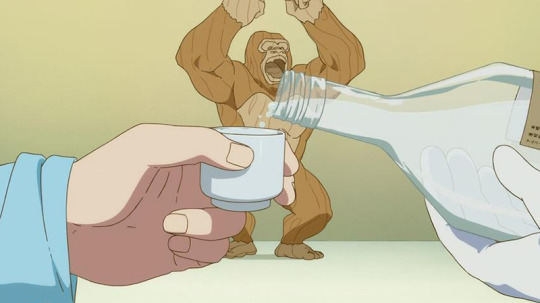
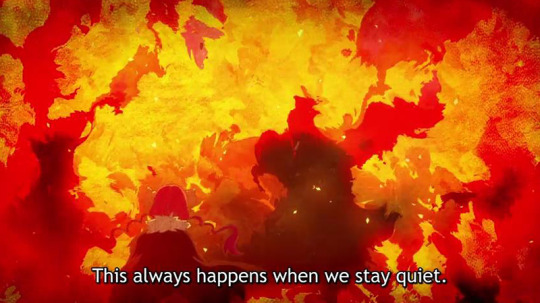
The “stay quiet” here is 大人し[い] otonashii, which takes the word for “adult” and adjectivizes it. It’s a common word with a variety of meanings, such as when something is “behaving” properly and not raising a fuss (from children to computer code to a chronic disease to political forces, all sorts of things) or when something comes across as “mature” (like a clothing design or a young person).
In this case the idea is that the dragons had chosen to “behave” and mind their own business, which (they seem to assume) led the humans into underestimating them and deciding to attack. (”Stay quiet” probably does a pretty good job of getting that across, but just to fill it out.)
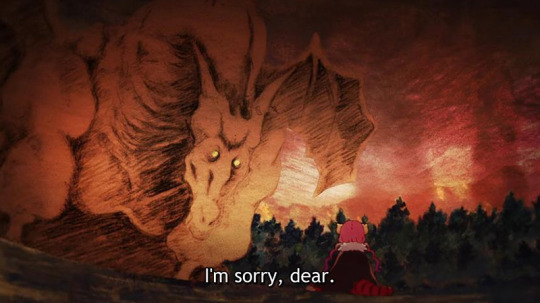
This is 残念ながら zannen nagara, or “unfortunately...”.
The reason I bring it up here, is that it’s not a particularly intimate way of speaking and leans somewhat formal—potentially implying Ilulu has no more close relatives left to give her this news (and/or maybe her family’s social position is one where other dragons had to treat them with respect).
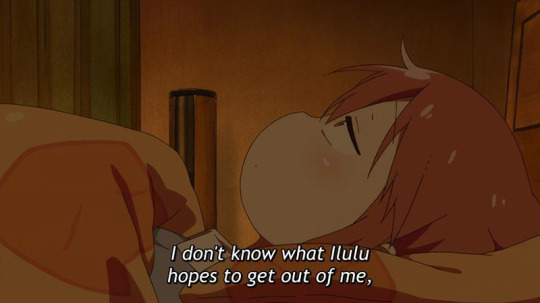
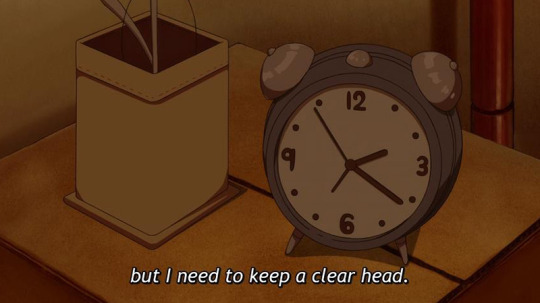
The second line here is 平常心を保つよ、私は, which is a fairly strong declaration of intent. I kind of feel like “I need to keep a clear head” sounds less confident, like convincing herself “ok bad situation, but if I just do this I’m fine.” In contrast, the Japanese imo is more of a “[Ilulu can do what she may,] but it won’t get it to me either way.” Just a mild point of characterization I suppose.
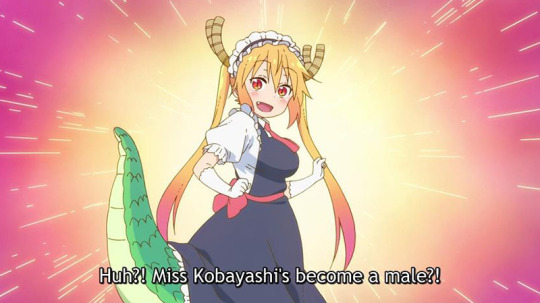
Just for clarity, she does use the word 雄 osu here, which is the more biological term for “in a sexually reproducing species, the one that produces sperm,” rather than a more gender-based term.
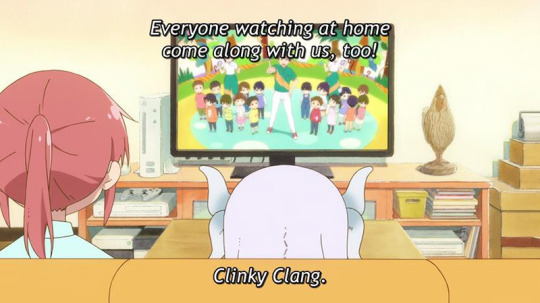
The TV show, シャシャシャシャキーン Sha-sha-sha-shakiin, is a combo reference to irl Saturday-morning kids’ variety show じゃじゃじゃじゃ~ン Ja-ja-ja-jaaN and weekday-morning シャキーン! Shakiin!.
The former’s name comes from the Japanese equivalent of ta-dah!, while the latter’s comes from the ”sound” for becoming alert, going from relaxed/sleepy/bored/etc. to “wide awake let’s go.” (though not necessarily sleep/wake related)
If you’ve seen these two emoji:
(´・ω・`) (`・ω・´)
The one on the right is the “シャキーン” one, and is the contrast to the gloomy one on the left (ショボーン shobon). Or these, going from asleep to awake:
( ˘ω˘ )スヤァ… (`・ω・´) シャキーン
In manga and stuff you’ll also see it used for e.g. someone drawing/brandishing a sword, striking a cool poses with a lens flare, things like that.
I think it gets translated to metallic-y sounds in English fairly often in those cases (like drawing a katana, or a mecha pose), hence the translation above.
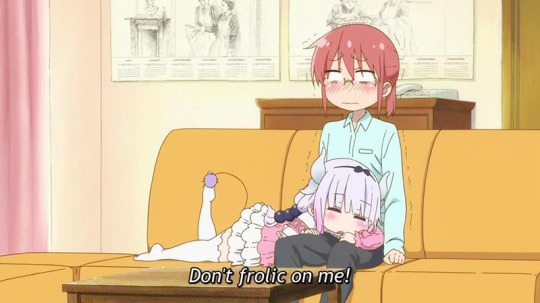
The verb for “frolic” here is じゃれる jareru (no relation to jajaan above), which is like to play/mess around, typically in a physical sense. For example it’s used in the compound word じゃれ合う jareau, which is often used in the same way English might say “playful wrestling” about kids or animals.
Though the word Kobayashi uses is actually a different じゃれる compound, じゃれつく jaretsuku, which is like playfully/affectionately grabbing/cuddling up/etc., (also primarily regarding kids or animals). There’s a bit of overlap with some of the uses of あまえる amaeru mentioned in the last episode’s notes.
Assuming I had the visuals, I’d probably just write this as “Please not on my lap...” or similar. (Kobayashi also uses a different verb conjugation for Tohru vs. Kanna in this scene, ~つくな vs. ~つかないで; Kanna’s being more plead-y compared to Tohru’s more “cut it out!” feel, hence the “please.”)
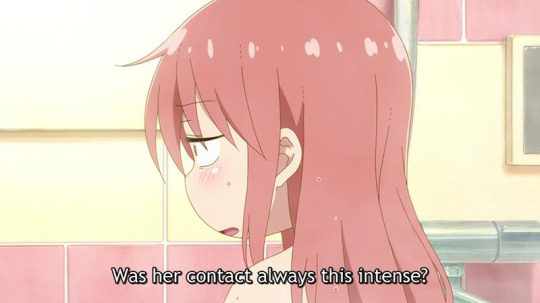
“Contact” here is “skin-ship,” a portmanteau-esque combination of skin and kinship or relationship. It’s primarily a Japanese word (you won’t find it in English dictionaries typically), but it was apparently coined by an American speaker at an international WHO seminar in 1953 (from which a Japanese attendee brought it back to Japan and it was later popularized).
The original use of the word was in reference specifically to parent-child physical intimacy, but as it became more widespread in usage the meaning extended to all sorts of relationships, from the platonic to the romantic.
One reason, presumably, that the term caught on so powerfully in Japan is that it has historically been a very touch-adverse culture (at least compared to say the US), and this extends even to parents with their children after the first few years. You’d see (and still see) psychologists recommend “more skinship” to people, for example.
The relative lack of skinship may partially explain the head pat thing mentioned in last episode’s notes (e.g. when you want to touch your kid, but hugs aren’t on the menu) and things like the old “hand-holding is lewd” meme. (Note this isn’t just me getting all orientalist here; there’s been a good bit of research on the skinship gap, and how it may be shrinking, by Japanese scholars.)
This line is also a bit of foreshadowing that Tohru has realized Kobayashi’s... situation already.
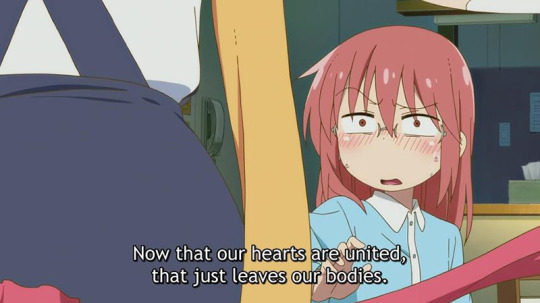
The Japanese here is 心と心でつながった後は体ですよ, which I only really mention because I kinda felt like the English’s “Now...” implied she was saying they only recently ‘connected their hearts,’ which I don’t feel from the Japanese wording and would say is probably not how Tohru thinks. E.g. more of a “Our hearts are already connected; now it’s time for our bodies!” kinda thing.
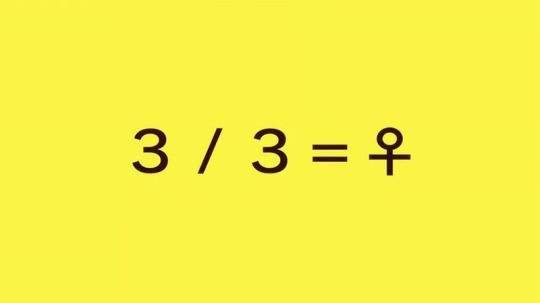
This 3/3 is March 3rd, which “equals” ♀ because that’s the date of Hinamatsuri, sometimes also referred to as Girl’s Day. The third day of the third month was originally a holiday brought over with the Chinese calendar, and it morphed from a more spring/peaches holiday into it’s more girl-oriented version at some point in the Edo period.
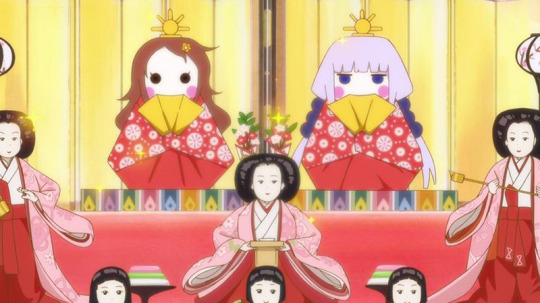
One of the highlights of Hinamatsuri is the doll displays, as pictured in this short bit with the Saikawa sisters. There are various types of displays, but this sort of staircase arrangement is the most common I believe. Each level has a certain type of doll that goes on it, with the top level having an “emperor” and an “empress” doll—which is the pair Riko replaces with dolls of herself and Kanna.
There’s some similarities between these doll displays and stereotypical Christmas trees: a family is likely to have a set of ornaments/dolls they mostly reuse each year, you put them up some time in advance of the actual holiday, then get lazy and leave them up too long put them away for a year after it’s over. A lot of businesses and such will put up displays as well.
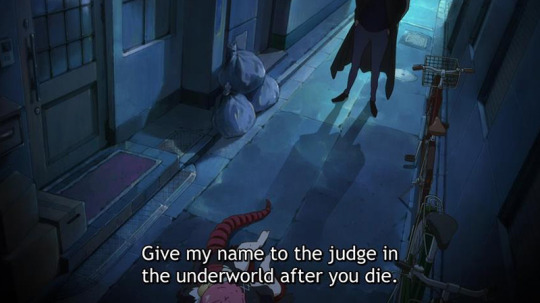
“The judge in the underworld” is left vague here and isn’t a specific reference to anything, but is generally in line with the typical “image” of what happens after you die (setting aside actual religious beliefs) in Japan.
Please see the documentary series Hoozuki no Reitetsu for more info.
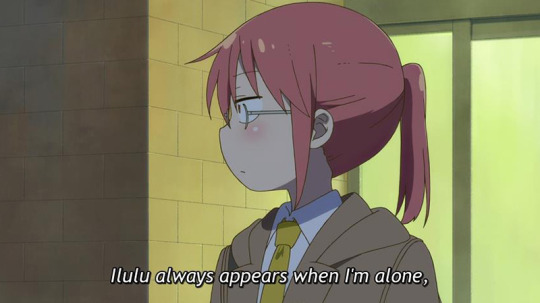
As of right now in the anime, Ilulu has only shown up twice, and only once of those when Kobayashi was alone. The implication seems to be that there have been other Ilulu encounters that we haven’t seen.
Also, for clarity, the Japanese is 私が一人の時にいつもイルルは来るから, which is more of a “whenever I’m alone Ilulu shows up” than a “she only shows up when I’m alone.” (The English could sorta be read either way I think?)
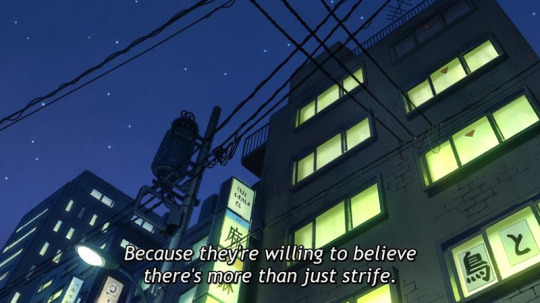
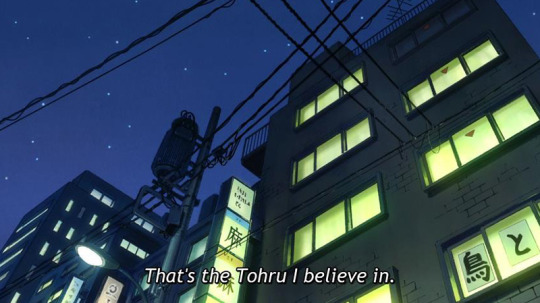
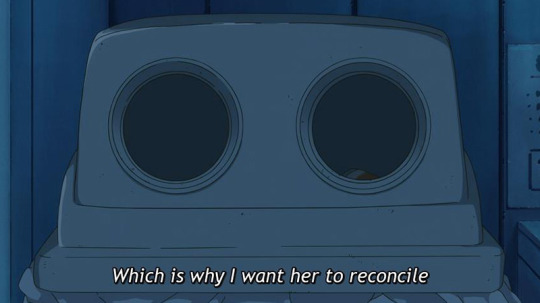
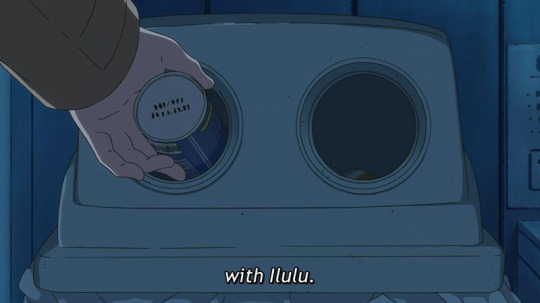
This bit is それだけじゃないって、争い以外もあると思ってくれているからだ。私はそんなトールを信じているから… だからその為にイルルと和解したい
The main point of contention I have with this English is that it implies Kobayashi wants Tohru and Ilulu to make up. However, I’d say this is more Kobayashi wanting to come to terms with Ilulu herself (and just by extension Tohru/the other dragons/maybe other humans).
That is, by making peace between herself the human and the “hostile” dragon Ilulu, she’d be helping prove Tohru’s belief correct—and she has faith in Tohru that it is (see also last season finale).
(Notably while Tohru is Chaos faction herself, there’s not really been another Chaos dragon yet to be convinced like this. Kanna is no-faction, Fafnir is technically no-faction even if Chaos-ish, Quetzalcoatl is an observer, Elma is Harmony, and Tohru’s father is an exception on multiple levels.)
Without getting too deep into the “why,” one quick thing I’ll point out is that she says 和解したい wakai shitai, not してほしい shite hoshii or させたい sasetai etc., meaning it’s something she wants to do herself, not want/make someone else do. Generally speaking you can’t use the ~たい “want to” form for anyone but yourself (you don’t know what anyone else is thinking, after all), unless quoting them, asking, or in the ~がる “seems to want to” form.
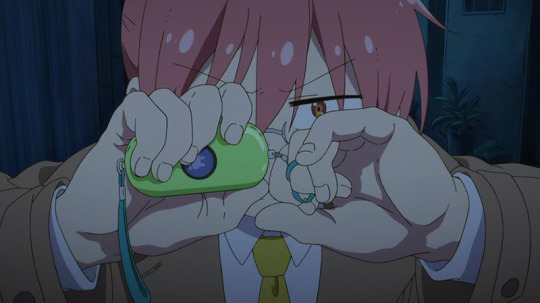
This is a 防犯ブザー bouhan buzaa, a crime-prevention buzzer, also known as a personal or self-defense alarm. They emit a very loud sound when activated. The idea is you, well, use it like she does here, when someone is trying to do a crime to you.
Since most Japanese children walk to school, it’s extremely common for these devices to given to students (either by parents or a gov’t body). It’s technically recommended for adults to carry them too, though the advent of the mobile phone has driven down carry rates.
This particular one was probably purchased in episode four of season one, if you want to rewatch and see why!
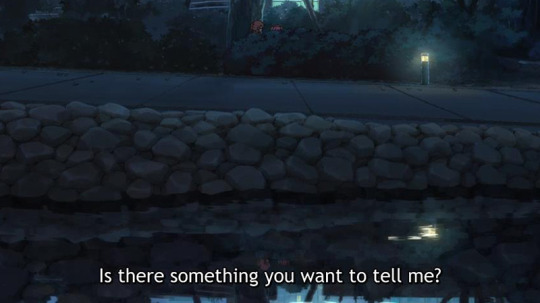
This is 私にぶつけたい気持ちでもあるの?in the Japanese.
The verb for “tell” is ぶつける butsukeru, an evocative word meaning ~to slam against (somewhat similar to “vent” in English when used with emotions/feelings).
The “something” is 気持ち kimochi, ~emotion/feeling/thought.
So the Japanese here feels a lot more expressive than "something you want to tell me,” I would say (that could just as easily be a translation of 話したいこと). That said it’s not an easy thing to express in English within the confines of the format here, especially if you want to keep the “target = ‘me’” part.
It might feel somewhat like “You got something bottled up you wanna hit me with?”, though I doubt if I’d use that either.
As a side note, the manga has Kobayashi say an extra line after this, about being the “main tank” to take her “hate” (Japanese for “aggro” in MMOs).
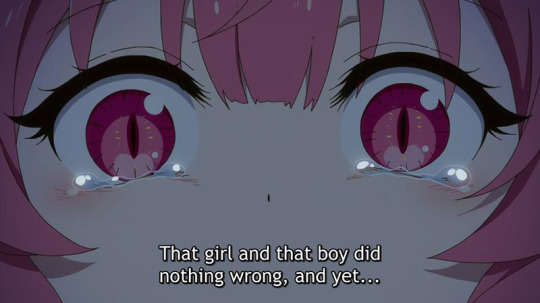
A small note that “that girl and that boy” is あの子とあの子 ano ko to ano ko, so no gender specification in the Japanese (it’s a good language for talking about people without specifying a gender!).
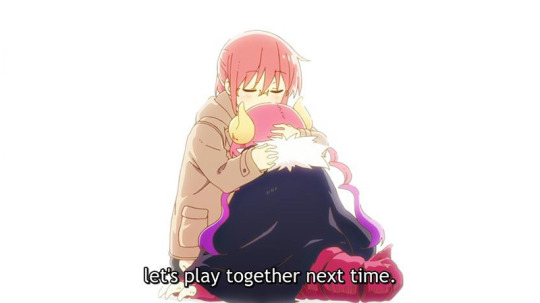
“Next time” here is 今度 kondo, which is an interesting word because you can situationally use it for “recently,” “this time,” “next time,” or “soon.”
The reason I bring it up here is the English “next time,” personally, leaves me thinking “Was there a previous time? What ‘next’ do you mean?”—just a heads up that that’s not really an issue in the original line.
Also: this whole extended scene with Kobayashi saving Ilulu is one of the “many senses” mentioned in the episode title. (see also episode one notes re ikemen)
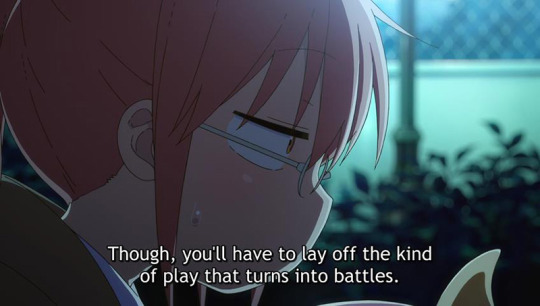
As an aside, this "play” is じゃれ合い jareai, the noun form of the jareau that was mentioned in the above “frolic” note.
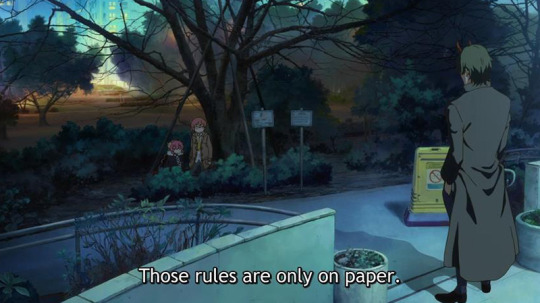
If you were wondering: “Do dragons use paper?”, the word here is 形骸化 keigai-ka, (almost) lit. ~reduced to bones, meaning something that once was strong/effective is now basically just a formality. It’s similar to the phrase “dead letter” in reference to old laws that aren’t really enforced anymore.
So two potential points of ~lore relevance~ here: 1) the rules probably used to be enforced, 2) we have no evidence (either way, from this) that they actually have them on paper somewhere.
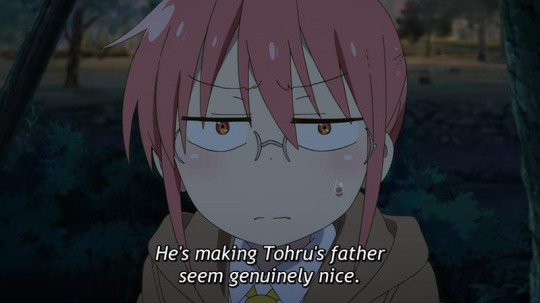
こりゃトールの父ちゃんは本格的に優しかったみたいだな
This might just be me reading too much into the English (again), but one difference in nuance between these two lines is that the English has Kobayashi implying Tohru’s dad “seemed” kind (which implies he’s not really kind, just kind in contrast to this villain), while the Japanese is more taking this as evidence that Tohru’s dad was actually being kind (see also last season finale).
For those wondering if the みたい in that line would imply a “seems”: it sort of does, but it applies across the whole observation here. I.e. “seems Tohru’s father was genuinely nice” vs. “making Tohru’s father seem genuinely nice” (which I’d guess would probably use 優しく見えてくる or something).
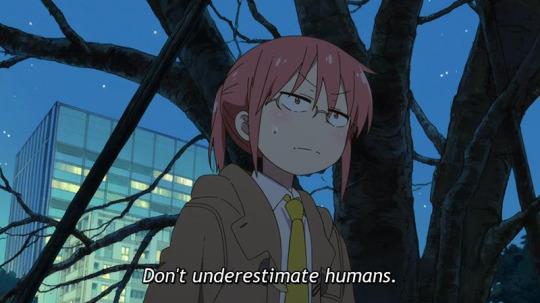
When you see “underestimate” in anime, most of the time it’s なめる nameru. It comes from the verbified archaic adjective 無礼し nameshi, meaning a combination of looking down on, acting rude towards, etc., and uses the same characters as “rude” (though often written in hiragana/katakana).
It also is a homonym of the verb “to lick,” so “Don’t underestimate humans” sounds identical to “Don’t lick humans.”
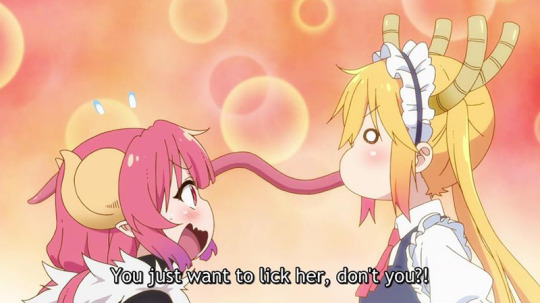
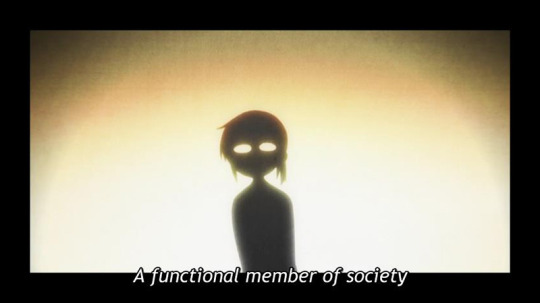
“Functional member of society” is 社会人 shakaijin, ~lit. person of society, which is a very commonly used word to refer to basically anyone who is an active member of society. It includes homemakers, so it’s not strictly “has a job at a company,” but in many contexts it’s used like “people with jobs” versus “students and NEETs.”
(Not that there’s anything wrong with the translation, just some extra context.)
A technique reminiscent of this shadow puppet silhouette style was also used in Hyouka, another Kyoani show and one directed by the late Series Director Takemoto Yasuhiro.
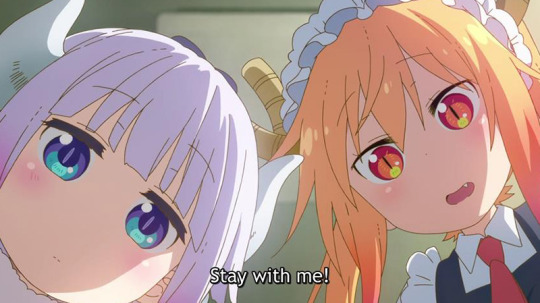
I kind of feel like yelling “Stay with me!” at someone injured is something you do when they’re in danger of fading away, not when they’re waking back up? Maybe that’s just me.
The Japanese is お気を確かに o-ki wo tashika ni, a polite (since Tohru almost always speaks kinda formally to Kobayashi, as part of the maid thing) way of saying “pull/hold it together,” and is used in a variety of situations.
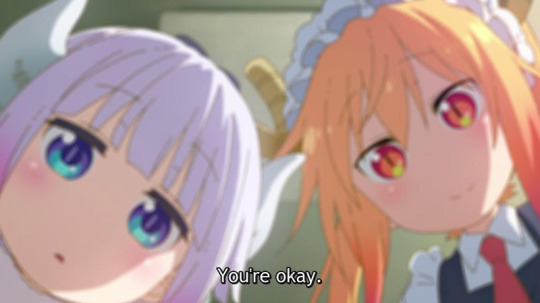
Kanna’s line is a question (e.g. like “are you okay?”) in the Japanese here, whereas the English sounds more like something you say to someone who’s injured to try to reassure them.
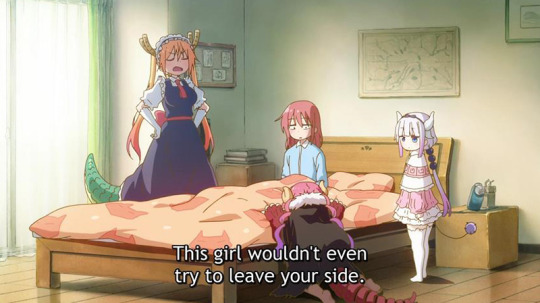
This line is その子離れようとしないんです sono ko hanareyou to shinai n desu.
The English is a pretty literal translation: hanareru is the verb for leaving/separating (in some senses), and the ~you conjugation means “try to ~”. However, that conjugation also has a second use in just indicating intent—especially when used in the negative, like here—so e.g. “She didn’t want to leave your side,” or “She wouldn’t leave your side at all.”

(◎Д◎)
Just in case: this is an emoji for expressing shock.
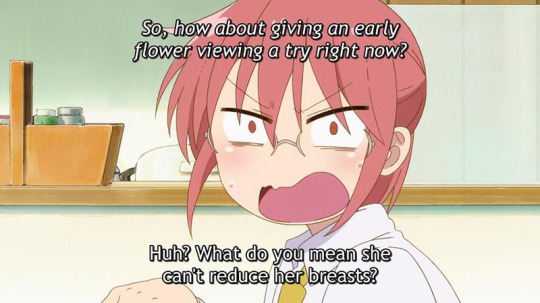
One thing that is left out of the English in this line is the だけ dake, “only.”
So Kobayashi’s not necessarily surprised at this by itself, but in contrast to the fact that Tohru says she probably can hide her claws/tail (so why not this too?).
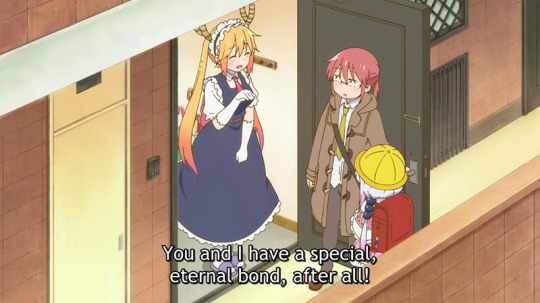
The base phrase Tohru is saying here is 私たちの仲じゃないですか, which roughly means “that’s just our relationship,” and is used commonly when being thanked for doing a favor for someone close. It’s similar in meaning to something like “hey of course, no problem, I know you’d do the same for me.”
Tohru puts a little spin on it by adding the “eternal” to make it 永遠の仲, which is a separate phrase that means probably what you’d think it means.
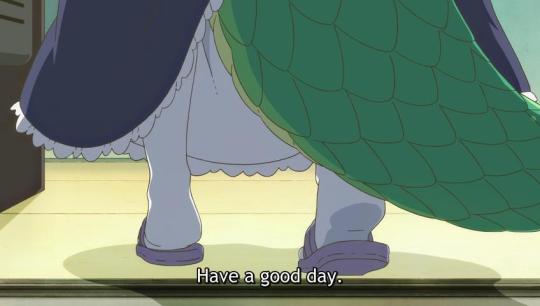
This quick cut to Tohru’s feet and the light “foot pop” motion... I have a hard time believing it’s anything but the director trying to give some subtle “goodbye kiss when leaving for work” vibes, even if they aren’t literally kissing. Just me?
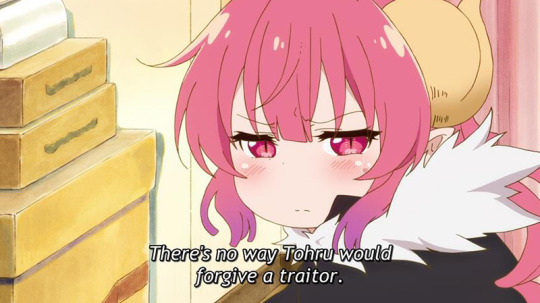
Here she says あのトール ano Tohru, lit. “that Tohru,“ which in this sort of context carries a meaning similar to using an italicized “that” in English: not just any Tohru, but that Tohru, the famous one. The implication is that yes indeed Tohru is well-known among other dragons—and known to be quite strong and merciless.
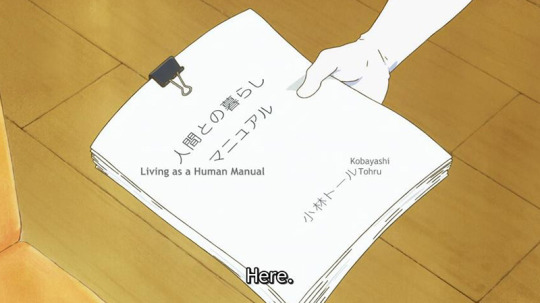
It’s not a particularly big deal, but technically this is 人間と, i.e. Living with.
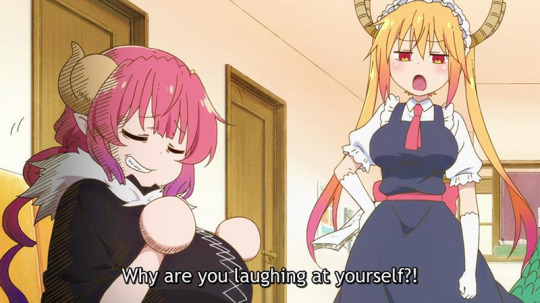
The ball hands thing is generally thought of as “Doraemon hands” in Japan. Doraemon gets the name from the food “dorayaki,” but “Dora” is also how you pronounce the first two syllables in “Dragon” (ドラゴン doragon).
Keep this in mind.
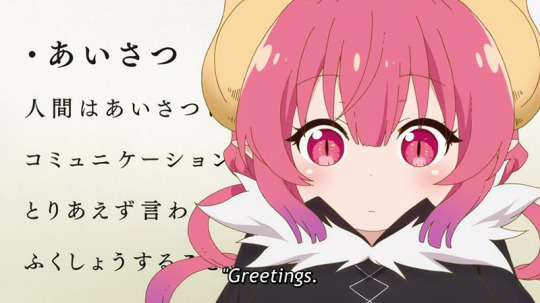
挨拶 (あいさつ) aisatsu, often translated as “greeting(s)”, is a lot bigger of a thing culturally for Japan than it might be for where you live. Though translated as “greetings” it also includes farewells and more. Basically a general term for “in X situation, say Y” style semi-set phrases.
In more traditionally minded companies, for example, employees are often expected to give a rote ohayou gozaimasu when they arrive (even if they think no one is around to hear it), and may get chewed out for not doing so or half-assing it. Then when passing someone in the hallway etc., an otsukare-sama desu, and yet another phrase when leaving for the day. Also the ittekimasu and itterasshai (when leaving home/saying bye to them) or tadaima and okaeri (returning home/welcoming back) that probably many anime-watchers are familiar with. Even itadakimasu is an aisatsu.
Obviously every culture utilizes “greetings” like this, but in Japan they’re pretty heavily ritualized and treated as a cornerstone of human relations, a key part of showing respect for your fellow humans (even people you hate!) and ensuring the smooth working of society. It’s not the thing they chose to have Tohru put first in her “living with humans [in Japan]” notebook for nothing!
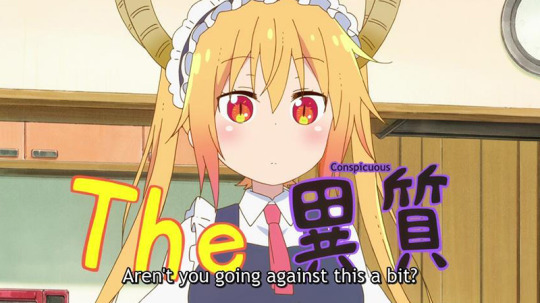
The English “the” is a popular word to use in Japanese as an intensifier, similar to how it’s used in a sentence like “this isn’t just an [example], it’s the [example]!”
It’s usually pronounced “za” and often written that way in katakana (ザ) for this usage. (If you type “za” in a Japanese IME, most will offer up “the” as one of the options to convert the text to, even.)
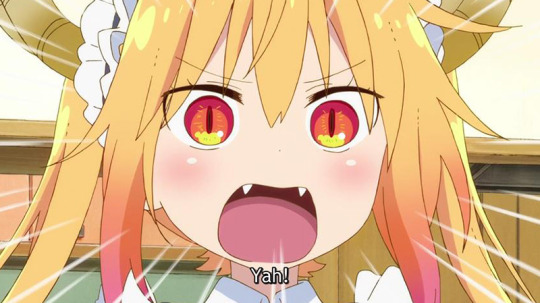
The word she says here is 喝 katsu, which, in this sense, is a stereotypical thing for a Zen teacher to say to a student as a stand-in for explaining some deep Zen concept that words can’t describe. So here, it’s kinda like “Yes this may seem contradictory, but really it’s just too complicated for you! No more questions!”
Obviously that’s oversimplified and it’s used in other ways too (see Saikawa’s father during the sports festival), but just for the purposes of this joke, there you have it.
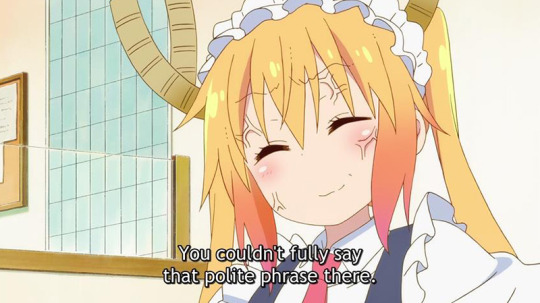
The word used in the Japanese here is 建前 tatemae. If you’ve ever studied any Japanese, you’ve likely heard about honne vs. tatemae, your inner feelings vs. the front you put up for social reasons.
People new to the language are sometimes prone to approaching that distinction with “well why doesn’t everyone just honne all the time, why play games?”, but of course almost everyone splits themselves like this. You probably hate your boss, but you also probably don’t tell them that to their face to avoid getting fired. Or maybe you have some family members you can’t stand, but act nice around anyway because it’s not worth the trouble to start fights.
Japan just put names to the idea, and maybe leans a little more toward encouraging tatemae in more situations.
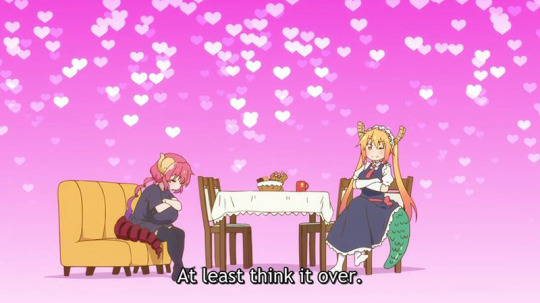
This is せいぜい悩むんですね.
せいぜい seizei as an adverb means doing something to utmost extent one is capable of. You’ve likely heard it from a villain somewhere saying something like “Struggle all you like, wahaha!”.
Though it’s not necessarily down-talky like that, in modern times that is the trend (you can use it for yourself no problem, but if used to talk about someone else’s actions it may come off as belittling). Tohru, as one of the strongest beings in the setting and with the pride to match, uses it a lot.
悩む nayamu is to worry, fret, ruminate over (some difficulty etc.).
The sentence in general is one that is highly context dependent, but here it’s Tohru thinking to herself, somewhat impressed, that Ilulu is actually putting serious thought into the question of what she wants to do with her life.
And, as the background suggests, finding it surprisingly adorable/admirable; up until just a few days ago, Ilulu was known as one of the most extremist Chaos faction dragons obsessed with nothing but destruction, yet look at her now. In a way, Tohru’s taken over an older sister kind of role for her.
(For the curious, if the ね was dropped or swapped to a よ here, that would imply she was directing the comment “at” Ilulu, rather than saying it in observation.)
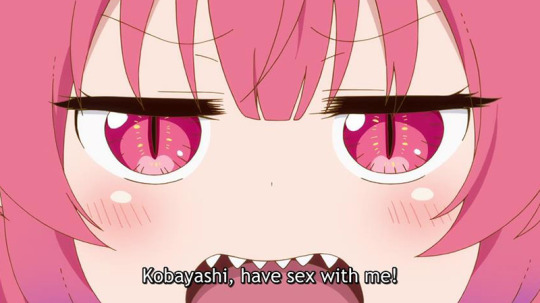
The word here is 契る chigiru, which usually means to swear/pledge (e.g. swear a pact, pledge your love), but can also be a somewhat fancy word for having sex, especially of a married couple.
I feel like I personally would have used more of a euphemism for the translation.
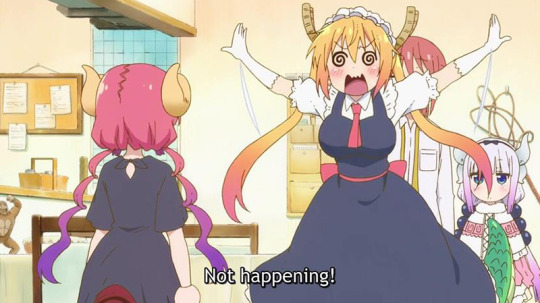
The phrase here is ダメの助 dame-no-suke, where dame is no/bad/can’t do/useless, and (no)suke is a common ending to first names; both actual names and sort of on-the-spot nicknames; someone looking sleepy might be called a 寝坊助 nebou-suke in the same way as “sleepyhead.”
Or, as here, sticking to the end of things for comedic effect or as indication of a panicked/confused thought process.
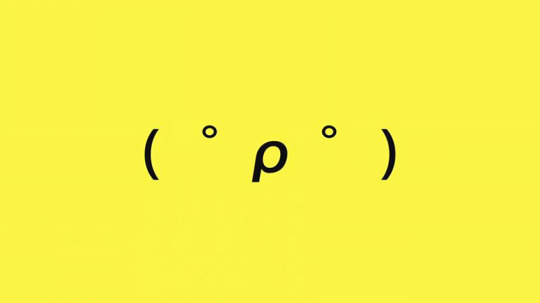
( ° ρ ° )
Just in case: this one is also expressing shock, but a kind of dumbfounded shock. The ρ is a drooling, slack-jawed mouth.
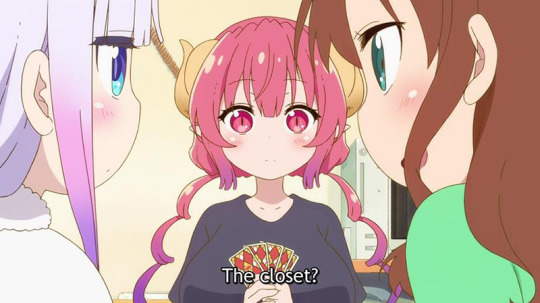
In the next episode preview they talk about where Ilulu will sleep, since they don’t have room for another bed. Ilulu wants to sleep in the closet—or more specifically, the 押し入れ oshi-ire, which is a particular closet layout you’ll find in many Japanese bedrooms.
The typical difference is that an 押し入れ was originally designed for 和室 washitsu, traditional-style Japanese rooms with tatami floors, primarily as storage space for folded-up futon/blankets/pillows, as you would put those away during the day to free up space. Thus they typically are rather wide, mildly deep, and have a waist-height, solid horizontal divider capable of supporting a lot of weight.
They actually are pretty okay for sleeping in if you’re not claustrophobic or tall.
Anyway, I bring this up because you know who else very famously sleeps in one of these? That’s right: Doraemon.
#maidragon#kobayashi's dragon maid#kobayashi-san chi no maid dragon#miss kobayashi's dragon maid#anime#translation notes#season 2
18 notes
·
View notes
Text
Final round-up of fan fic asks
I've gotten a few more interesting responses to the fan fic discussion so I'm going to round them all up here. This will be my final post on the topic until/unless there's a dramatic new development, or a particularly notable response I want to highlight. Thanks to everyone who brought their thoughts and experiences to the topic. I hope everyone at least feels heard.
The biggest piece of advice that I would like to offer is for everyone to focus on what they love rather than what they hate. If we all did that, the world would be a better place. Alongside that, I'd like to remind everyone to please support authors whose work you like. It's so important. Give them a kudos, give them a nice comment, recommend their work to others. You never know what kind of grief and harassment they are dealing with to bring you these great stories, and our support means a lot.
This is in reference to previous posts here and here.
Anonymous asked:
With regard to fandom and fan fic issue, my years of experience being part of very large fandoms has led me to believe that big accounts are v important in facilitating and enforcing the general consensus of the whole fandom. Unless there will be big accs who'll remind everyone of being respectful & just not being a dick over other's preferences, nothing will change.
This is also the reason why I think certain solo fandoms have adapted weird and twisted narratives as their general fandom story because no big acc has tried to police them & and say hey pls be rational. Whether we like it or not, in a place where how far voices, ideas, tweets, posts get heard is based on the number of followers you have, big accs will have the power and influence in creating/curating/shifting the narratives.
So, if you want to know why your/our fandom thinks like this in general, look at what big accs are tweeting/posting, look at what ideas & values they follow, look at their preferences or how strongly they react to certain situations. it's taxing and toxic for big accs given the nature of social media these days, but it's also the reality of system, the more followers/audience you have, the more influence you will have.
So to anyone reading this I hope we all practice more restraint and reflection before we post anything. Remember that words, no matter what medium you write it in, will always carry weight.
So true. It is easy - even for myself who spends a fair chunk of time answering people's asks - to forget that people can sometimes be impressionable and what we say can influence people whether that's our intent or not. I get used to thinking of myself as a regular guy just doing my own thing when sometimes my thoughts and words go well beyond where I initially posted them.
I think it's important for us to be careful what we say, and it's equally important to be careful what we take from what other people say. Especially when it comes to big claims. Always get a second, third, fourth opinion and don't be afraid to ask for clarification if something doesn't sit right or sounds confusing.
It's also important to reflect on how our words and actions might affect other people's experience of fandom, and err on the side of 'live and let live' wherever possible. It's great to have our own preferences and to champion them, but we should try to do so in a way that leaves space for other people and perspectives.
The more unique perspectives and the more friendly, open dialog there is, the healthier the community will be as a whole.
There's nothing wrong with encouraging and guiding growth in the particular areas we are interested in, as long as it doesn't step on, oppress or attack those who are peacefully enjoying something different.
Anonymous 2 asked:
bjyx fans attacking gdgdbaby for including zsww/lsfy dynamics in an event named bjyx then turning right around and attacking the zsww/lsfy event organizer for excluding bjyx? god, can you hear my facepalm and sigh of resignation and incredulity from over there? im genuinely not surprised that they're trying to drive an entire part of the fandom out by disgusting them (and me) with these immature tactics. i believe what im about to say next will sound quite bait-y and i respect your decision 1/?
should you choose not to post this. but i do know that it is not only me, in fact there are many out there, that is of this opinion. we just dont talk about it on twitter to avoid the potential mess it will bring lol. okay, here goes nothing. (do note that im talking about the majority here, not every single person is like this) so bjyx fans tend to be cishet females whereas zsww/lsfy fans are more diverse in terms of age and gender, and most of them are part of the queer community too 2/?
i would like to clarify that most of these zsww/lsfy fans are not dynamic exclusive (in the sense that they are friendly and interact with all ggdd fans) they just prefer to "identify" themselves as zsww/lsfy fans (on twitter specifically) just to form a distinction from bjyx fans who mostly are dynamic exclusive (as in; they do not consume non-bjyx content, and straightup refuse to interact with non-bjyx fans, often blocking them). as a result, id say that the zsww/lsfy communiy is way more 3/?
mature and respectful (after all, they're mostly queer people talking about a queer ship) whereas many problems in this fandom, such as the homophobia, adamantly insisting on "drawing lines" between dynamics, stem from the bjyx exclusive fans, comprised of cishet females who "may not know better". so, it is of no surprise to me that they're resorting to these immature tactics of calling gg unsavory names, and organizing retaliatory events with controversial topics in an attempt to "purify". 4/4
I trust that you have arrived at that theory through your own experience and observation. I haven't personally spent much time immersed in this stuff so I can't claim to have any real insight or expertise. If you say that's your experience of it, then at the very least that's how you've seen things up to this point.
I just want to say that I think we should always be careful about making assumptions about people's age, gender/gender identity, etc.
There are plenty of good reasons to avoid doing that; because those assumptions could be very wrong, because those assumptions are often laced with ageism, sexism, etc., because those assumptions - even when correct - might not be an accurate basis for the conclusions we draw.
But the primary reason I recommend avoiding those type of assumptions is because anything that enables us to clump a group of people together in our minds like that will tend to make them easier to demonize and dehumanize. They are no longer individuals who are each responsible for their own unique perspectives, they are now 'the X group' who is known for 'A B C series of easily attackable ideas or behaviors'.
If we attribute undesirable traits and behaviors to a group of people we feel opposed to in some way, that makes us feel more righteous and justified in behaving unfairly toward them, dismissing their humanity and warring with them. It's just risky behavior to engage in, even when it's well-intentioned.
There might actually be some truth to what you're saying. It could very well be that most of these people are young, inexperienced, heteronormative, etc. but if that's the case then we should try to use those traits to better understand and empathize rather than to better dismiss and discredit.
Just my two cents on that.
It can be really frustrating dealing with what feels like other people attacking us, trying to oppress us, etc. - especially when there are more of them than there are of us. In my experience the best solutions to that sort of problem are generally the ones that focus on what we are doing and want to do rather than what they are doing that we don't want them to do.
As I am always preaching, we can't control what other people say, do or think. The only thing we have any control over is what we say, do and think (and how we respond to what they say, do and think).
I have found in my experience that the moment I step out of a conflict mindset and instead step into a problem-solving mindset, everything starts to come together. I feel better, my outlook is more positive, I can begin to see solutions and allies rather than problems and enemies, and most of all, I become more focused on what I am doing than what others are doing.
So I would recommend everyone who is invested in resolving these conflicts focus on that. "How can we best showcase and encourage the types of stories we enjoy?" instead of "How can we stop these other people from doing things we dislike?"
Anonymous 3 asked:
Hello again! It’s anon #3 from the fanfic post. I really do appreciate reading your thoughts on various issues like this, so thank you for always taking time to write in depth. As for supporting without going to war, the simplest way has always been to just show appreciation for the creators, hype them up. Kudos are the easiest way on ao3 but comments in addition are great. This goes for all content—art, fics, vids..etc. Creators love to see and read how people react to their content. Sharing is also great, fic recs are very helpful, just be cautious with art and reposting though. Hope this helps a bit!
Thanks so much, Anon. I think this is excellent advice. And it's true that appreciation is great, but helping to expand the audience is also great. Recommending stories, pointing people to the pages/websites of artists we like (as opposed to reposting), sharing our own ideas and approaches, encouraging people to try new things... all of this helps build healthier communities.
And here's another one: WRITE! DRAW! CREATE!
I urge anyone with creative interests or talents to bring their voices to the community because we all can benefit from hearing from you.
Thanks again everyone for sharing your thoughts on this issue. I hope that over time we can all work in positive ways to improve the situation.
I think this subject has been well-covered now so I'm going to retire it for the time being. If anyone still feels they want to discuss it further please feel free to message me privately. Thanks.
16 notes
·
View notes
Note
whys it a worthless video essay? genuinely curious on your thoughts :0
The racism mostly!
Disclaimer: i’m white, and not meaning to speak for any person of color! My opinions on this are formed based on what i noticed in combination with what i know about racism, and I believe that in this case i’m right about what i’ve observed. That said, my observations are open to criticism from any black people who might be reading this and feel like weighing in, as my only personal experiences in bigotry are with my identity as a queer person. In short: i’m not an expert, but i do have eyes and what they see is repulsive. Anyway this will be rambly.
First and foremost, The Tragedy of Droids by @popculturedetective’s editing directly connects the Droids in Star Wars with the atrocities of chattel slavery in the americas, and the perceived connection is at times hinted at in the script.
@4:10 into the video “...they’re also bought and sold like cattle” is a quote i caught when trying to find the following time stamps, because the editing is the real beast here.
There’s also @ 4:35 “you can probably guess where i’m going with this, because the social arrangement i’ve just described is one of property and owner. And a property relationship between two intelligent beings that gives one absolute power over the other is called slavery.”
In this video essay, there are multiple times when the visuals cut between Roots and the droids of Star Wars. This is important because Roots is a mini series based off the family history of the black man who wrote the book, Alex Haley, and the scenes being directly juxtaposed with Star Wars droids are the scenes from it where black people are on slave ships or being sold at auction. TToD essay, which was at the very least presented by a white man, wants the viewer to connect robots and black people for the sake of the essay’s argument. TToD essay wants the connection between real black human beings who actually lived and suffered and died in the real damn world to, i cannot stress this enough, machines.
To anyone who is reading this and not seeing why thats fucked up, because they view the droids as people, here’s the problem. Droids aren’t people. No matter how you slice it, no matter how much you love them, theres actually no way for us to be sure that 99% of droids are sentient beings, that are self aware, and that feel things. Droids in the Star Wars universe are constructed to be tools that talk to you and have fun personalities. Some droids might be self aware and sentient, but the likelihood is that the vast majority aren’t due to being what they are. Tools. This is in stark contrast to black people, because black people are, uh, people!!
At 4:00 into the video essay, we start to see the cuts between Roots and Star Wars. Pop Culture Detective cuts between C-3PO/R2-D2 being sold to Luke’s family and a black woman being put in front of a crowd of white people to be auctioned off. This same sequence of cuts is used again later in the video essay.
At 28:20 into the video, a clip from Star Trek: The Next Generation is used wherein Guinan (played by Whoopi Goldberg, a black woman) is talking about slaves and slavery, how there have been disposable people in history. This clip on its own is so, so good. It aired in 1989, and I have no idea what the political climate was like for black people then (im not as well versed in history as i would like) but i can guess it probably wasn’t good!
“...They do the dirty work. They do the work that no one else wants to do because its too difficult or too hazardous. You don’t have to think about their welfare. You don’t think about how they feel. Whole generations of disposable people.”
And then Pop Culture Detective uses this (to me) powerful line about atrocities done to human beings... and cuts to R2-D2 serving drinks to Jabba’s crew. PCD says some bullshit about how star wars is using the droids as an allegory for slavery but has nothing to say with the metaphor, and then it cuts back to Guinan to finish her speech. Might i say: what the fuck. What the fuck.
I can’t find it right now, but i distinctly remember there is also a bit where the visuals cut straight from a black man’s face to the face of an astromech.
And the cherry on top is that the clones are in this video... and never mentioned. Okay actually i’m going to talk about this video’s treatment of the clones and how utterly fucked up it is because i was so caught up in the “this essay wants you to think of the horrors of chattel slavery done to black people as being even remotely comparable to the existence of R2-D2” that i forgot to talk about the clones.
Okay so this video does not mention the clones at all. It uses clips from the clone wars and clips from the prequels movies with clones in them, but the clones aren’t even so much as talked about in passing. The closest we get is this brushing off of the issue in general @29:50:
“Remember, this is a universe where humanoid slavery exists as well, but its presented as unambiguously negative, though not exactly something the heroes are in a rush to abolish.”
Which is said about Anakin and his mother. And its not like they forgot about the clone wars and to talk about it at all! No, they had this to say on it @15:10. See if you notice anything.
“...But what about Battle droids?... Well, the separatist droid army in the prequels seems specifically designed as little more than canon fodder. Making the bad guys unfeeling robots avoids the messy moral complications and mass casualties that would result from an interstellar war. If battle droids aren’t alive then the audience doesn’t have to care when thousands of them are killed in extended battlefield scenes. Indeed we’re encouraged to think of these types of droids as mere objects and to cheer at their dismemberment.”
Drink it in y’all, i’m still absorbing it. I’ll note that sections of this were played over clips from the first battle of geonosis, and there were clones on screen. So, PCD completely sidesteps the issue of the clones, seemingly unaware of the actual explicit enslavement of brown men who are unquestionably living thinking feeling people, in favor of projecting humanity onto every single droid including the infamously poorly programed B1 Battle droids.
I don’t know what else I can say on that besides the fact that some obscure ass clips from the clone wars are used to humanize the robots, implying that PCD watched tcw and missed the episode where Slick calls the Jedi slavers.
There’s other problems with it as a whole, like the essayist completely failing to prove beyond a reasonable doubt that all droids are sentient, or that even most droids are. No consideration is given to the purpose, construction, or make/model of droid into the question of “are they sentient”? And we’re left with the implication that your average mouse droid is at all relatable to a black person.
In fact, PCD in this essay seems to actually imply that r2-d2 and bb8 being sentient-ish robots we’re supposed to empathize with, and the battle droids being not that, is due to a failure/breakdown of internal logic. And not that they’re, you know, different machines...?
I have so much to say on this mess, but this is long enough as it is. In conclusion, Pop Culture Detective’s video essay should have been about the clones, but it chose to focus on droids instead and in doing so dehumanized black people in an attempt to humanize robots.
I’ll leave you with this quote from the video, but edited slightly to be instead about the clones.
“[Slick]’s observations about [clone] slavery could have been an opportunity for Star Wars to finally grapple with the uncomfortable fact that...the good guys seem to have been keeping sentient beings in a state of perpetual servitude.”
45 notes
·
View notes
Photo

Advice from a Professional Doctor, Asher Nitin.
Ignore all the portrayals of life in medical school by your pre-med lecturers.
If they begin a med school narrative with, “My nephew is a doctor and he told me…,” instantly disregard it. His nephew did not tell him that. He told him much more. Those are merely the parts he wants to remember.
If it isn’t a recently-graduated doctor telling you what life in med school is like, it isn’t going to be anything like what they will tell you.
So what is it like instead? Grey’s anatomy? House, M.D.?
Neither. Med school is more like Scrubs and The Knick than it is like Grey’s Anatomy and House, M.D.
Unlike Grey’s Anatomy, you and your fellow medical students will not be that good looking. You will not sleep with each other as much. You will not cry over your patients (you’ll have a hard time remembering their full name). And you will not monkey around with barely-tested experimental procedures. Ever. If you do, it’ll probably be the last thing you do because good-bye medical school.
Unlike House, all medicine will be diagnostic. Your professors will only appear to be brilliant (it’s really just decades of specialized knowledge and experience; with their subject and with your type). Diagnosis will be algorithmic, and even that algorithm won’t be your own. But you will still get a kick out of it.
Like Scrubs and The Knick, your medical school will be your life. You will eat, sleep and dream medicine. Your entire social circle will consist of your colleagues. Your family will be the one stable point in your life. You’ll date your colleagues.
Speaking of dating, your sexy does not go up when you become a doctor. I mean this practically.
Theoretically, I’m told doctors are hot. I can see why. They undeniably have inherent value: social standing, (the promise of) money, proof of intelligence (actually, no) and actual power over life (more than you know).
But practically speaking (especially if you’re male) your dating life will not get better as a medical student. That is because the demands of medical school will swamp you. You will come home tired. Your pool of prospective partners will mostly consist of your medical colleagues. So while your newfound status as a doctor might have value in non-medical circles, it will mean nothing because you will almost never frequent those circles. But within the circle you’re in, your status as a medical student means nothing, because so what? Everyone is one too.
“But Asher!” you say, frantically gesturing at me to pause, “I’ll be smart and date outside of medical school.”
No, dummy. You’ll be a dummy if you do that because…
The more friends you have outside of med school the harder it is to excel.
Med school is about an ethos. You’re not just part of a course. You’re part of a community. This is now your primary identity. All your self worth are now belong with us, bi*ch.
There is this neurological phenomenon seen in people trying to study. When you’re focused on something, if you break off and engage with something unrelated, your brain takes up to twenty minutes to fully refocus on the original task once you return to it.
In life as well, broadly speaking, I’ve observed a similar phenomenon. I’ve known three students in med school whose circle of friends mostly lay outside of med school. One hung out with mostly dancers and choreographers. One was a socialite. One hung out with the sons of politicians. They all were (and still are as of now) the worst doctors I have ever seen. This is because they constantly take breaks from the ethos of medical life. They miss out on the rhythm of life in the world of medicine.
So you should know that…
You will leave most of your old friends behind, and you won’t even mind.
Of all the various professions, I’m told, physicians tend to default the most on school reunions. That is partly because they don’t have the time, but also because they don’t care.
It isn’t that we become arrogant or unsocial. It is that the act of medical education deeply changes you. It makes you more functionally intelligent. It makes you less prone to fake drama. It makes you calmer in crisis.
All these after-effects will permanently drive a wedge between you and many of the people you used to know. This is a surprising side-effect no one anticipates; least of all your elders. And that is an amusing paradox. They anticipate your becoming a doctor because they know medical school is elevation. They don’t realize the side effect of this elevation is you will now talk down to them.
Your most important subject in pre-med is physics.
Look, pre-med isn’t really about information continuity. The organisms you will dissect in pre-med will be phylogenetically disconnected from med school. You dissect a plant stem, a plant root, an earthworm, a cockroach, a frog, and then… a human being? See? You won’t be seamlessly connecting domains of knowledge.
Pre-med isn’t even about building a conceptual base. Many things you learn in pre-med biology will be repeated in so much greater detail in med school that your prior knowledge will only partially help.
Pre-med is about picking up mental skills you will need. Let’s talk about those.
You need to learn to form a train of thought fast.
The great thing about learning to solve problems in physics is that you learn to solve problems in general. You learn to quickly identify variables and constants. Sometimes there will be constants in the problem that would normally be variables in real life. You learn to work with those too.
Physics allows you to become mentally agile with concepts. If you get fluid mechanics, you can handle the physiology of hypovolemic shock. If you get lever mechanisms (in different orders), you can handle applied anatomy in orthopedics. If you get optics, you can handle a lot of neurology and ophthalmology.
In my experience, the students who have the hardest time in med school are the ones who didn’t learn to think on their feet within a fixed framework of time.
You hate memorizing? Actually, you don’t. It’s all about the context.
Literally none of us salivated at the prospect of memorizing taxonomies. We hated it and struggled over it and were glad when we were done with it. That was because it was something we knew we would never use.
In med school, you will do a lot of memorizing. But you will enjoy it (or at least you can, if you choose; I’m a huge nerd). Many doctors will tell you how easily drug classifications embed themselves in their brains. This is despite the fact that the latter are more complex than zoology taxonomy charts or botanical floral formulas. The difference is that your knowledge of drug classification will impact what you will say to your aunt when she confronts you over her persistent back pain over Christmas dinner (poor posture, it’s always poor posture; she sits like a potato).
So you will memorize a lot. It won’t be anything like memorizing was before. Rest easy. You will find it easy to like it.
Your persona does not matter. Caring for people and being compassionate and wanting to cure disease are the least important things in medicine.
You need to be able to meaningfully link vast amounts of information to come to a correct diagnosis as per established algorithms. You need to perform surgical procedures within a reasonable amount of time with a decent degree of success. All else is secondary.
When most of your non-doctor relatives tell you that a doctor’s personality matters, they’re doing something called argument from ignorance. You see, the world of medicine is so big and so complex that most of it is technically incomprehensible to the general public. So they latch on to the few aspects of a doctor’s life they are mentally capable of understanding (and commenting upon; remember their first reaction to meeting someone with an education superior to theirs is to give them tips). So they will talk about a doctor’s personality because it is the only part they can presume to have some expertise on. Even that they do not.
Don’t ever do stupid things like falling in love with your patients or building deep and personal relationships with your patients. You will never last in medicine. This is not because the emotional trauma of losing them will wreck you. This is because you will go bankrupt fighting lawsuits accusing you of patient preference.
You will feel the pressure in the things non-doctors will say behind a good doctors back. “He’s so boring at parties, he can only talk work stuff.” If that is your destiny, so be it. Own it. They find you boring? So what? You were not put on this earth to entertain the illiterate at parties. You were sent here to be a lifesaver; not to have a personality that appeals to the lowest common denominator.
I’m telling you it does not matter. The practice of medicine is life on the edge of reality. All personalities are welcome because medical school is a personality in itself.
The materialists among us are taught the value of wisdom and the ascetics among us learn to knot a Double-Windsor.
The atheists among us will pray frantically and the religious among us will find no time for church on Sunday.
The loudmouthed learn to whisper in the NICU and the soft-spoken learn to yell, “Stat!” in the ER.
The type-A personalities among us learn to break the news of a patient’s passing to his relatives and the type-B personalities among us learn to argue medico-legal cases.
The clumsy among us learn to suture wounds and the nimble learn to administer CPR.
Materialists.
Ascetics.
Atheists.
Theists.
Loudmouthed.
Soft-spoken.
Type-A.
Type-B.
Clumsy.
Nimble.
In medical school, we all meet in the middle.
PS: Photo not mine. Credits to the rightfully owner.
11 notes
·
View notes
Text
rant
A thing that kind of bothers me sometimes when I read some opinions on routes various characters should have taken in canon, or fanfiction that isn't taking an ooc approach and is actually trying to keep canon characterization and is somewhat missing the mark is how they don’t take a few thing into account that, in my opinion, are very important and impactful.
Some characters simply will not make certain decision or see things a certain way under some specific circumstances.
One thing that I think can be helpful in understanding characters is to break them up into a few core facets. Let me preface this by saying that I have no professional knowledge of literature or psychology, it’s simply my personal way of going about it and I could very well be wrong.
So I personally prefer it when people consider a few thing while analyzing characters. Core values, lesser values, natural temperament (the inclinations they are born with, this could be hereditary or individual), environment and world view.
Core values are things that I personally consider to be quite stable and relatively unchanging unlike lesser values which I consider quite malleable and flexible in comparison.
An example of this would be family for Sasuke. Sasuke’s every decision and action was coloured by this. His life goals were all based on this, all the people he cared about were people he could see his family in, even in the case of his more “humanitarian goals” like building a better system for less suffering, a big part of it was him wanting to build the village itachi dream of as we see from that moment he thought he was going to die against madara. It stands at the core of his interactions with the world and how he views things and every meaningful thing in his life is tied to it. It’s the thing he ultimately values and everything else spins around it. How much this affects his various decisions are up for interpretations but family being one of his core values was quite explicit and hard to deny. Why that is his core value is a different subject which I personally am not qualified to tackle but it could perhaps uncover another layer of values but lets not go there.
It’s generally a consistent thing for most people from my observation. It’s a different thing from world views.
Natural temperament is a thing that I think anyone whose pets have had kids can understand. They are born around the same time to the same parents in the same environment but you can see from early childhood some of them are more bitey than others, some are more social, some are more playful and like variety while others are content with siting in their usual place and playing with that one toy they really like, some are picky eaters, ... some of these are individual and some are inherited like in the case of unique and recognizable habits that their parent had and they also have. In Sasuke’s case for example, we can see that he’s generally more on the introverted side and has been so since his younger days. Him becoming a social butterfly or something along those lines would be very unlikely and out of character.
Natural temperament is how we naturally react but of course, it goes without saying that we can choose to go against our natural inclinations and behave in different ways like if we naturally have a short temper that doesn’t mean we can’t choose to keep it under control and while that obviously require effort and motivation (or some form of reason and proper progression) we can’t always say this character is naturally inclined towards dishonesty so he can’t be honest or something like that but we have to consider why someone would go against a certain inclination they have and their degree of success given a variety of factors. That reason or motivation should be at least somewhat compatible with their core values, world views, ... and the motivation/reason’s strength is also important in the success factor.
An example of this is when Sasuke, who is generally a principled character and abhors senseless killing (if it was possible, he generally knocked non-Itachi people out and didn’t go for the kill), goes against his principles during the kage summit arc. He doesn’t just randomly do something out of character, there is a visible logical progression, you can see how that happened.
The effects of the environment on people is very vast and diverse, and it’s something that is almost always a factor worth taking into consideration. The most influential period for this, I consider to be the early developmental period. This includes things like their parental figures and their relationship with them, their education system, their friends and those they associate with, the people they respect or idolize, the general environment and culture (what’s considered normal, what is considered intuitively right or wrong, where values are, how the role of citizen is defined, what things are they exposed to, ... ), their social and economic class, to some extent their climate and dietary habits, ...
World view is another thing that colours their interactions with the world. This is something you can figure out through their actions and reaction not through their words. People’s world views are what they live by and it affects how much different things impact them and in what way. Once you’ve got a good grasp of their natural temperament and their core values you should be able to figure out some core elements of their world view. Like I already mentioned, this is what they live by not what they say so be careful of that.
Here are some examples of “the world does not last” view:
an example of a “death is the end” approach: “nothing in this world lasts whether it is sorrow or joy, every breath taken can be our last and in the end we become dirt so why give up the joy of today or stay hung up on sorrow” or alternatively “why bother living”
an example of a “existence is eternal” approach: “existence is eternal and the unlasting world is only a tiny portion of it, no woe or sorrow is as great as we imagine and worthy of lament and no glory or power is worthy of boasting, neither last and all is nothing but a spec of dust in the grand scheme of existence ...”
Now, how a character approaches things once they figured out their world view is something that depends on a bunch of things and you might want to look at those earlier stuff like core values again for it. Like someone who has an inherent need for greater meaning isn’t going to have a good time with that “the world doesn’t last and death is the end” approach. Keep in mind, world view, unlike core values, tends to change as we gain experiences, knowledge, ... and they generally aren’t that fixed, lesser values play a role here as well. Also keep the whole exchange in mind, they colour our experiences and how we see and react to our environment and our experiences and environment shapes them as well. Contradictions are also verrrry common so that’s also a thing to look out for.
While some people are more consistent then others, we may even have different world views on different days depending on our mood and stuff and there is no reason why a fictional character wouldn’t.
18 notes
·
View notes